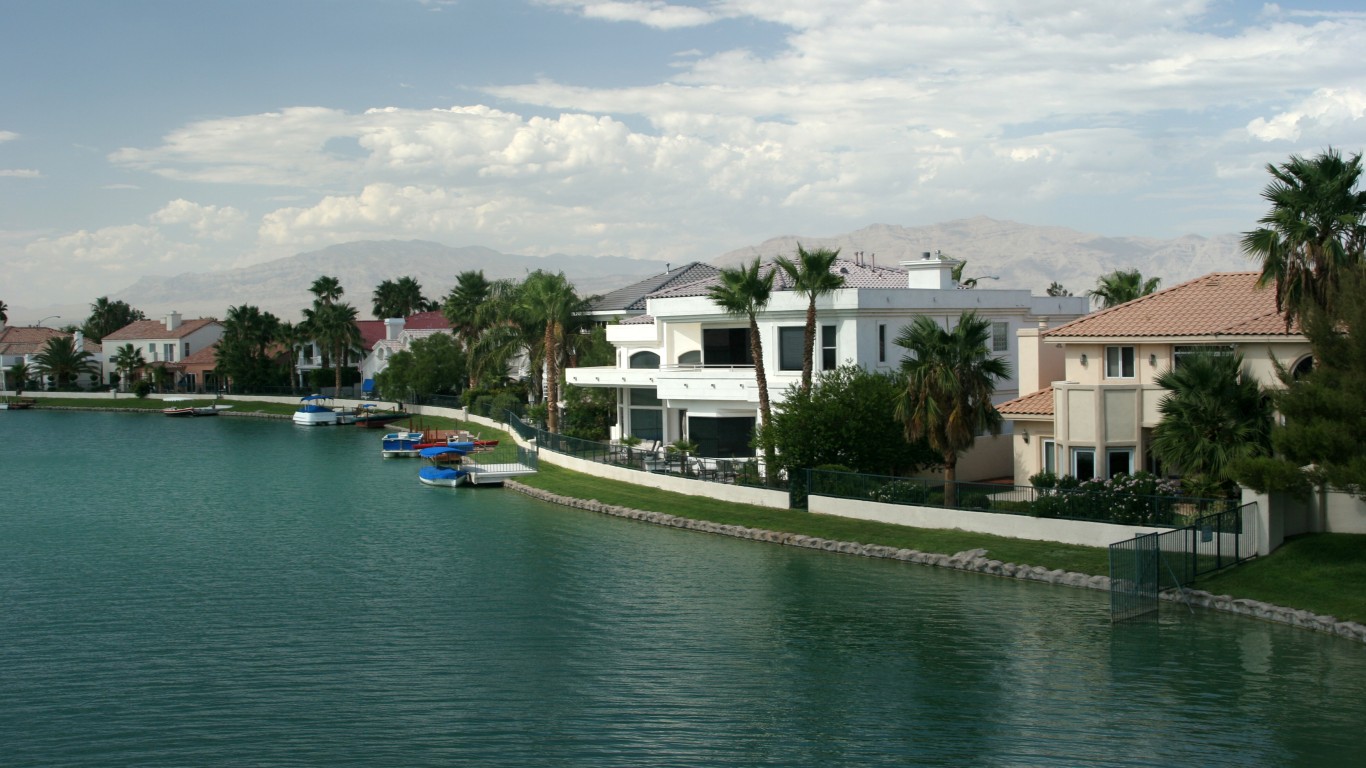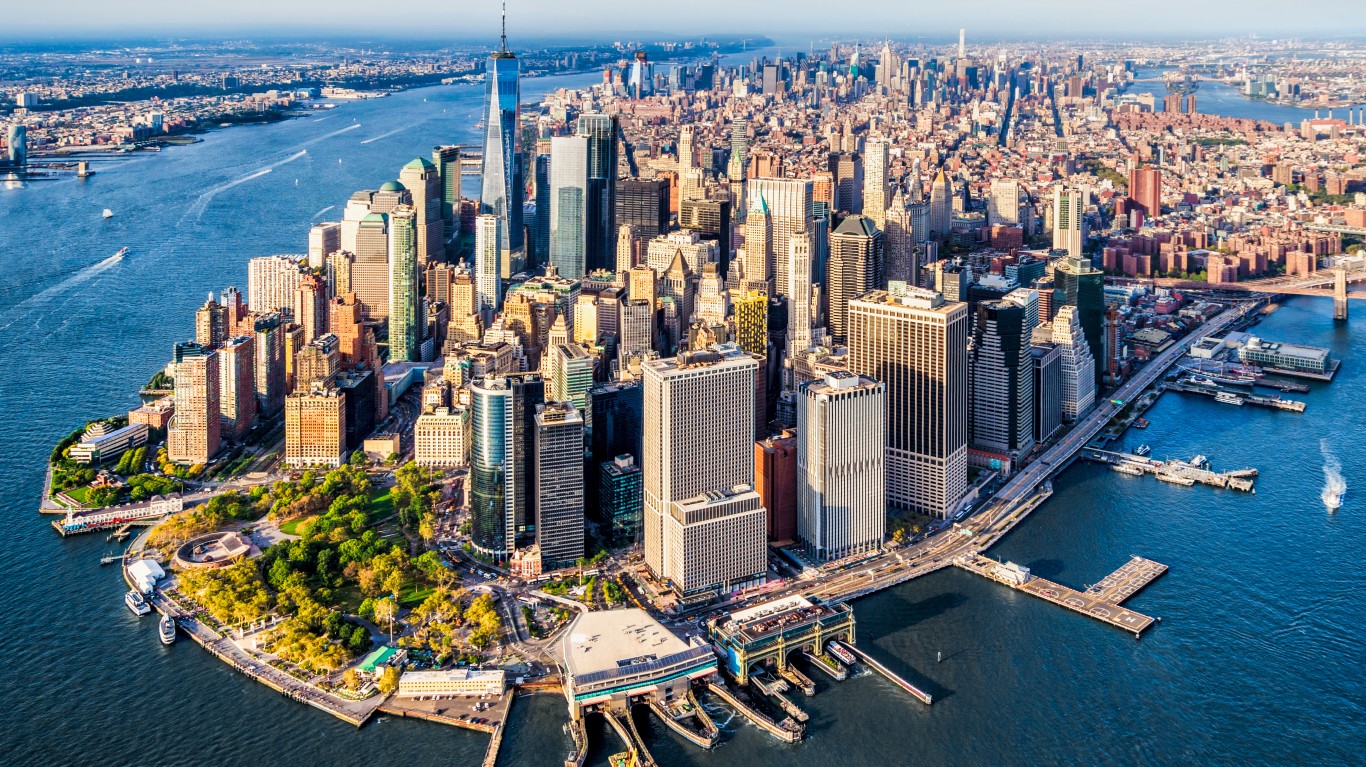
The United States population accounts for just over 4% of the world population, and geographically, the U.S. covers 1.96% of the Earth’s surface or 6.1% of its landmass. China similarly covers about 6.3% of the world’s landmass, but is home to about 17.5% of the world’s population. And India, with a population similar to China’s, covers only 2% of the world’s landmass. It is perhaps therefore not surprising to find that some of the world’s largest cities by area are in the U.S.
To identify the world’s 50 largest cities by area, 24/7 Wall St. used data from the August 2023 edition of the World Urban Areas report from Demographia, an urban development research group. Only the 986 urban areas with 500,000 residents were considered. Cities on the list are ranked based on their built-up land areas, rather than any official boundaries of cities or jurisdictions. Demographia explains that such built-up urban areas “function as an integrated economic unit, linked together by commuting flows, social and economic interactions.”
By this definition, the New York City urban area includes the New York City metropolitan area, as well as areas in Connecticut (Bridgeport, Danbury, New Haven, Waterbury), East Hampton, Riverhead, and Trenton, New Jersey. As a result, the New York metro area ranks as the largest worldwide with 4,380 square miles. (Also see: Cities With the Highest Influx of New Residents Last Year.)
New York is not the only American city on the list, but one of 21 U.S. cities ranking among the world’s 50 largest by area. This is despite the fact that most U.S. cities do not have among the largest populations and are definitely not among the most densely populated. China follows the U.S. with five cities on the list, with the region East Asia & Pacific accounting for 17 cities. Tokyo, which ranks third by area, has the largest population of the 50 cities listed, at 37.8 million, though it is not the most dense of cities on the list. Of the 50 cities, Delhi, which ranks 43rd, is the most densely populated with 34,464 people per square mile.
50. Kuala Lumpur, Malaysia
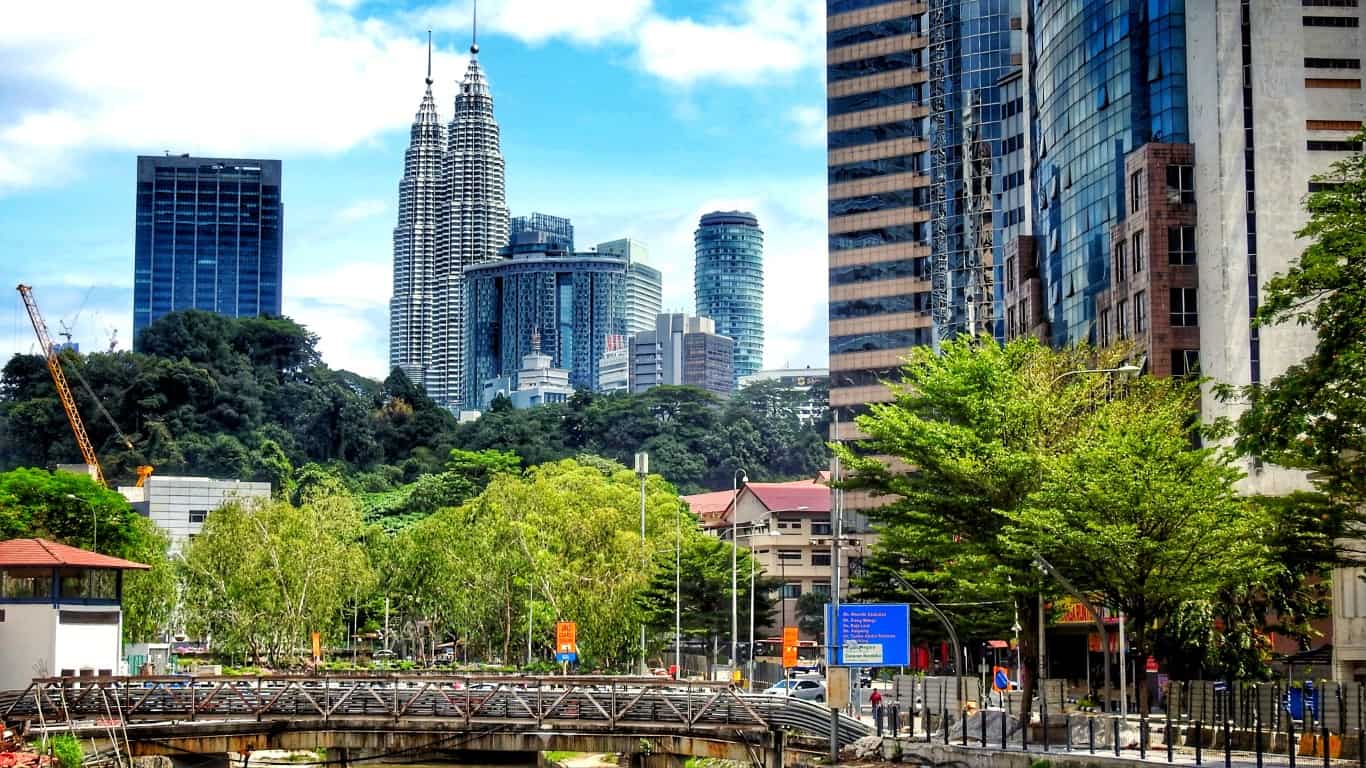
- Built up urban area, 2023: 835 square miles (or 2,163 square km)
- Estimated population, 2023: 9,387,000 — #49 largest of 986 urban areas
- Population density: 11,242 people per square mile (or 4,341 per sq km) — #539 densest of 986 urban areas
- World Bank geographical region: East Asia & Pacific
- Country class (World Bank): Upper middle income
49. Ho Chi Minh City, Vietnam
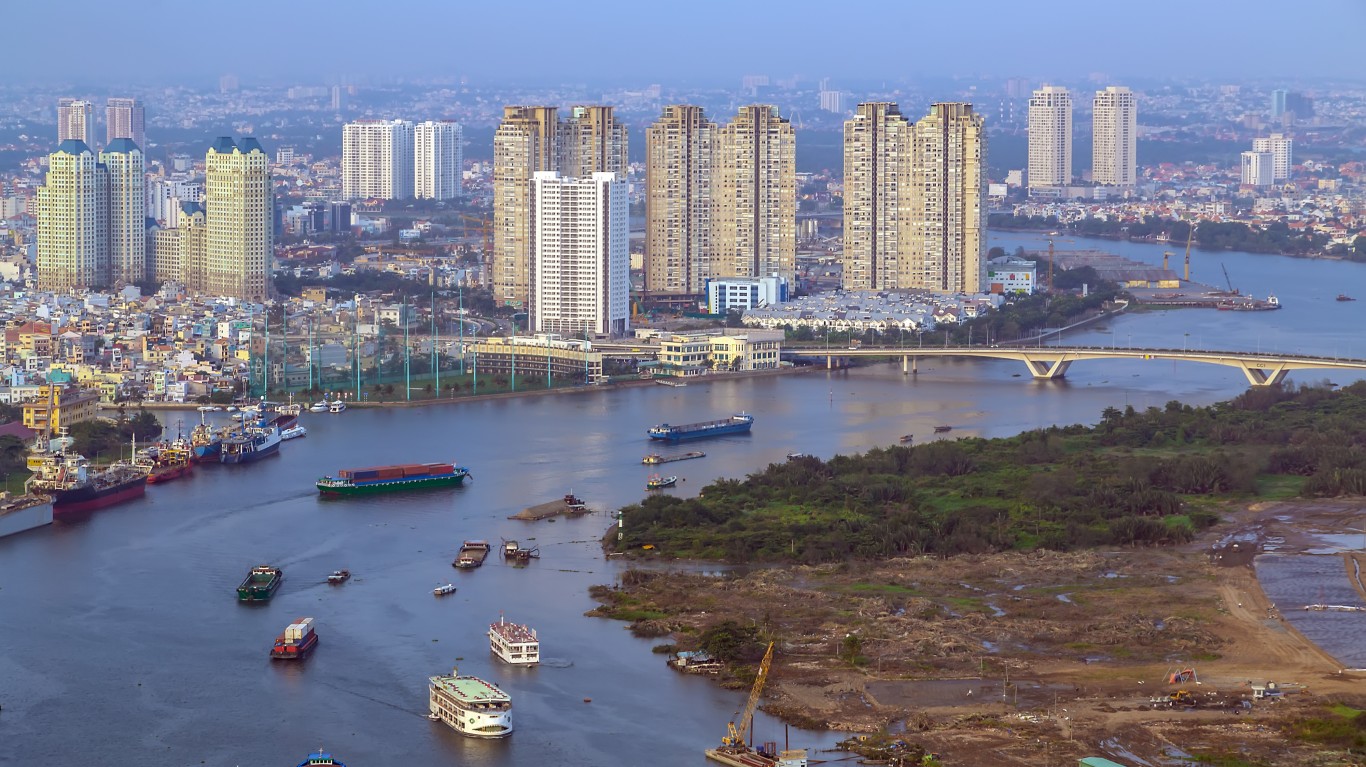
- Built up urban area, 2023: 836 square miles (or 2,165 square km)
- Estimated population, 2023: 14,953,000 — #25 largest of 986 urban areas
- Population density: 17,886 people per square mile (or 6,906 per sq km) — #291 densest of 986 urban areas
- World Bank geographical region: East Asia & Pacific
- Country class (World Bank): Lower middle income
48. Sydney, NSW, Australia
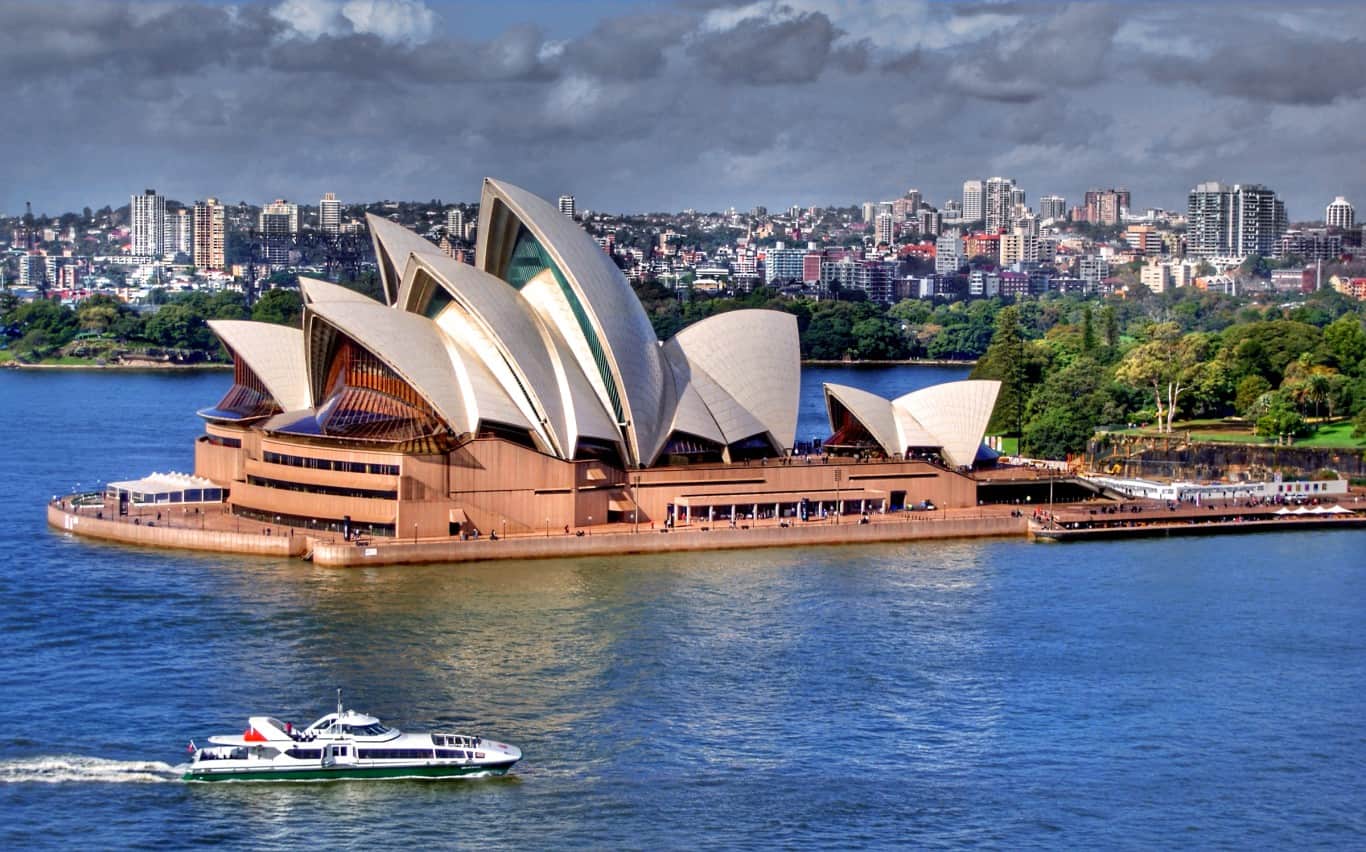
- Built up urban area, 2023: 847 square miles (or 2,194 square km)
- Estimated population, 2023: 4,836,000 — #104 largest of 986 urban areas
- Population density: 5,709 people per square mile (or 2,204 per sq km) — #859 densest of 986 urban areas
- World Bank geographical region: East Asia & Pacific
- Country class (World Bank): High income
47. Milan, Italy
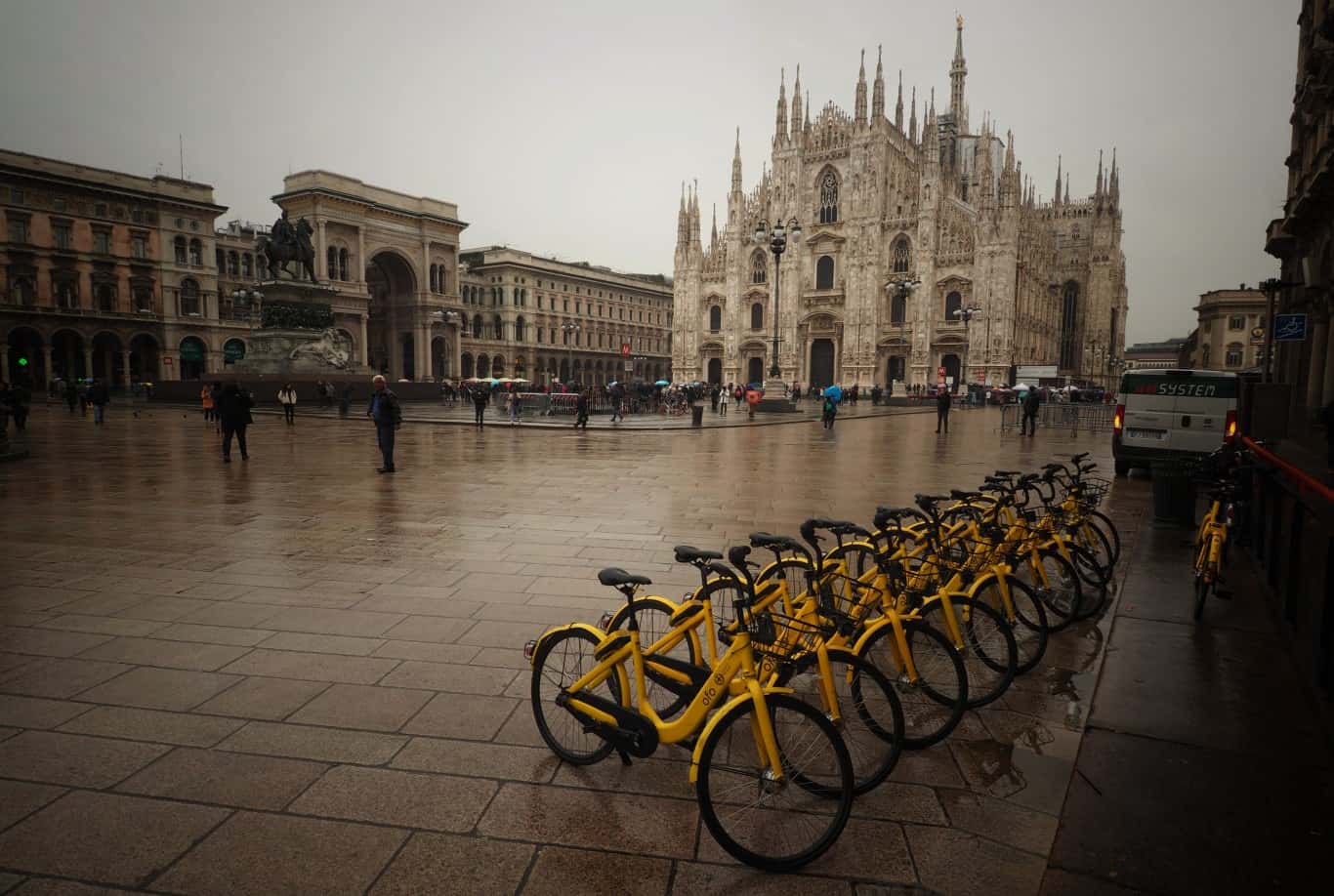
- Built up urban area, 2023: 859 square miles (or 2,225 square km)
- Estimated population, 2023: 5,471,000 — #90 largest of 986 urban areas
- Population density: 6,369 people per square mile (or 2,459 per sq km) — #833 densest of 986 urban areas
- World Bank geographical region: Europe & Central Asia
- Country class (World Bank): High income
46. Quanzhou, FJ, China

- Built up urban area, 2023: 868 square miles (or 2,248 square km)
- Estimated population, 2023: 6,743,000 — #70 largest of 986 urban areas
- Population density: 7,768 people per square mile (or 2,999 per sq km) — #737 densest of 986 urban areas
- World Bank geographical region: East Asia & Pacific
- Country class (World Bank): Upper middle income
45. San Juan, US: Puerto Rico
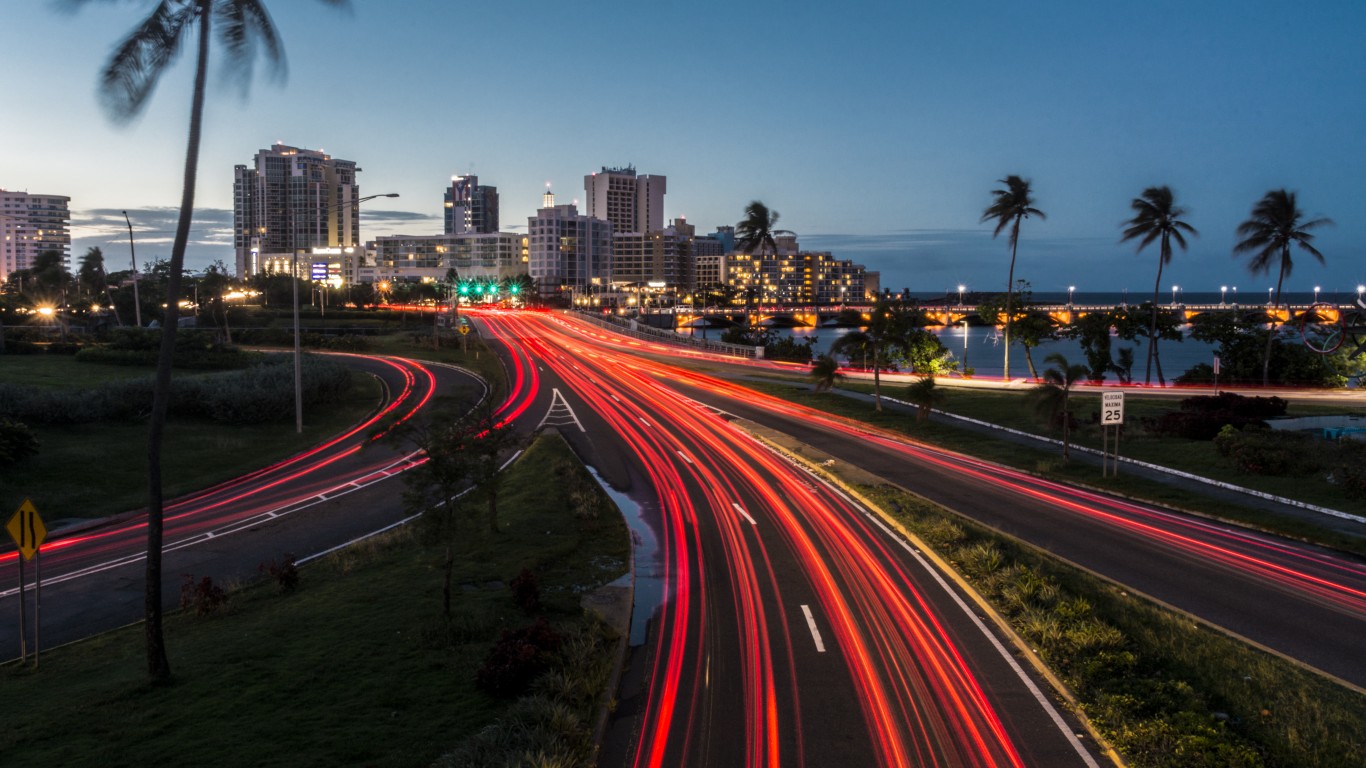
- Built up urban area, 2023: 876 square miles (or 2,269 square km)
- Estimated population, 2023: 1,846,000 — #295 largest of 986 urban areas
- Population density: 2,107 people per square mile (or 814 per sq km) — #971 densest of 986 urban areas
- World Bank geographical region: Latin America & Caribbean
- Country class (World Bank): High income
43. Toronto, ON, Canada
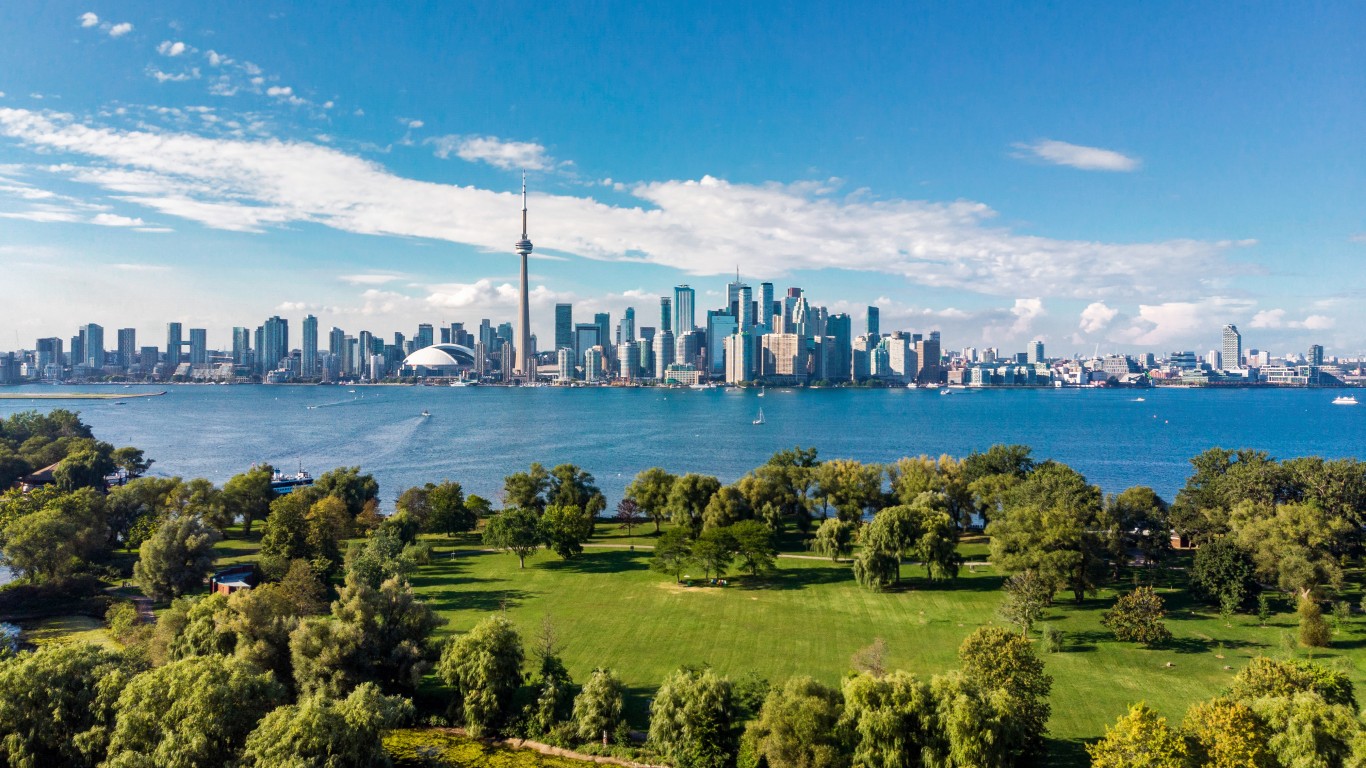
- Built up urban area, 2023: 905 square miles (or 2,344 square km)
- Estimated population, 2023: 6,837,000 — #66 largest of 986 urban areas
- Population density: 7,555 people per square mile (or 2,917 per sq km) — #749 densest of 986 urban areas
- World Bank geographical region: North America
- Country class (World Bank): High income
43. Delhi, DL-UP-HR, India
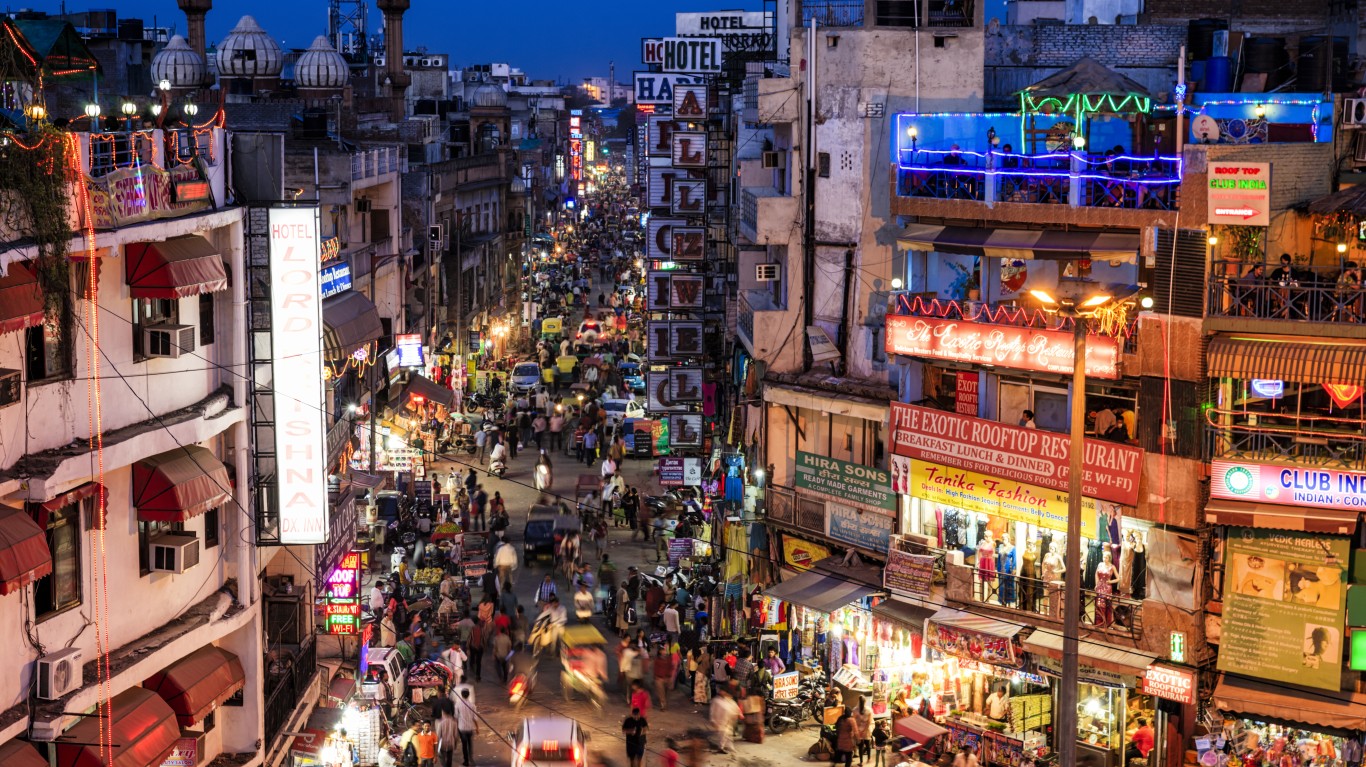
- Built up urban area, 2023: 905 square miles (or 2,344 square km)
- Estimated population, 2023: 31,190,000 — #3 largest of 986 urban areas
- Population density: 34,464 people per square mile (or 13,307 per sq km) — #88 densest of 986 urban areas
- World Bank geographical region: South Asia
- Country class (World Bank): Lower middle income
42. Pittsburgh, PA, United States

- Built up urban area, 2023: 907 square miles (or 2,349 square km)
- Estimated population, 2023: 1,738,000 — #307 largest of 986 urban areas
- Population density: 1,917 people per square mile (or 740 per sq km) — #979 densest of 986 urban areas
- World Bank geographical region: North America
- Country class (World Bank): High income
41. Minneapolis-St. Paul, MN, United States

- Built up urban area, 2023: 969 square miles (or 2,510 square km)
- Estimated population, 2023: 2,796,000 — #191 largest of 986 urban areas
- Population density: 2,886 people per square mile (or 1,114 per sq km) — #946 densest of 986 urban areas
- World Bank geographical region: North America
- Country class (World Bank): High income
40. St. Louis, MO-IL, United States
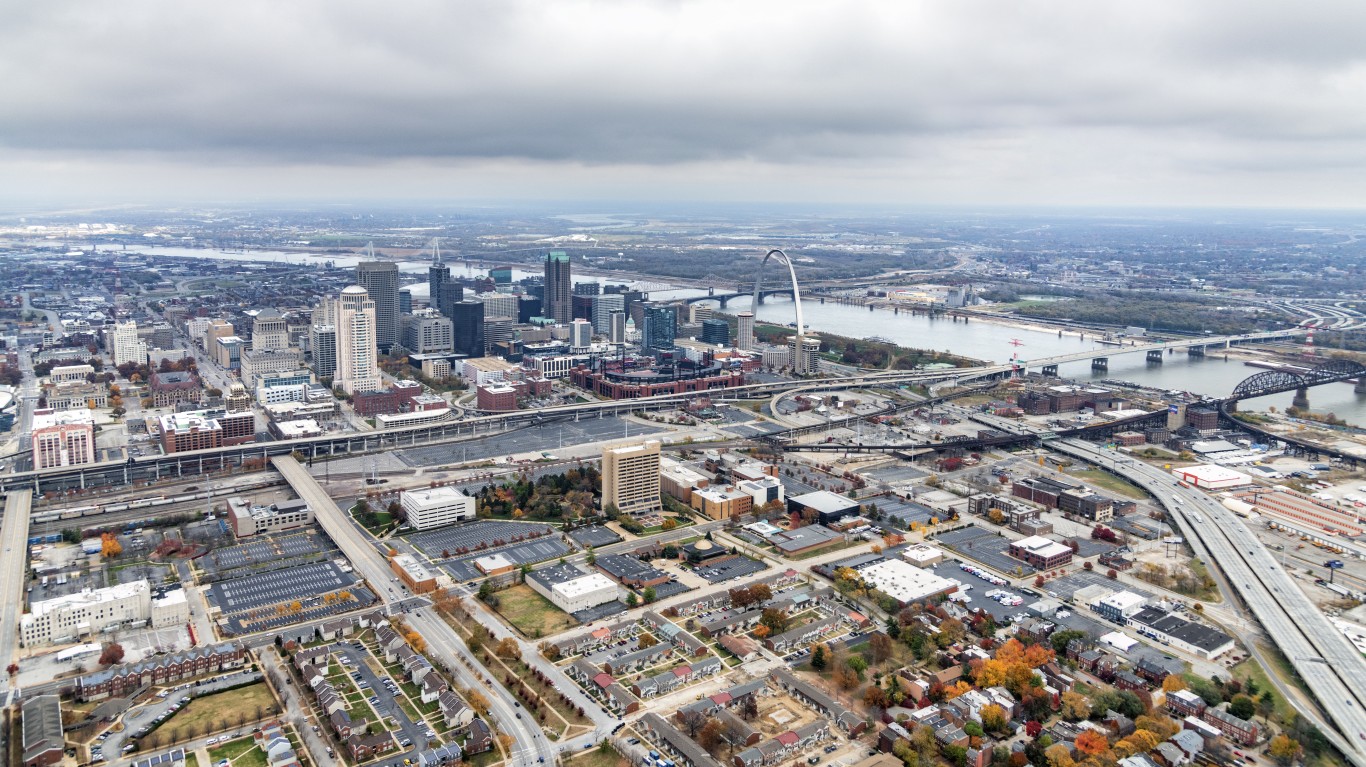
- Built up urban area, 2023: 970 square miles (or 2,512 square km)
- Estimated population, 2023: 2,247,000 — #239 largest of 986 urban areas
- Population density: 2,316 people per square mile (or 894 per sq km) — #961 densest of 986 urban areas
- World Bank geographical region: North America
- Country class (World Bank): High income
39. Mexico City, Mexico
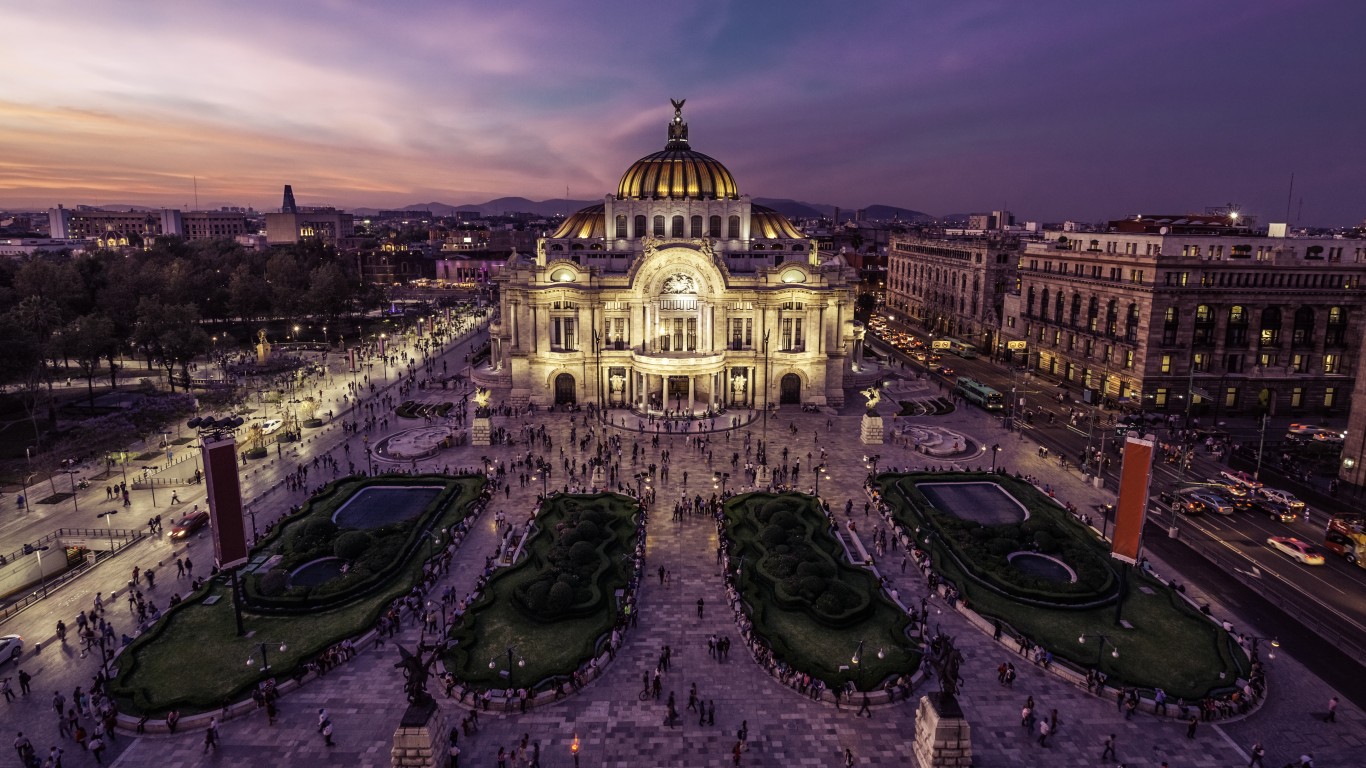
- Built up urban area, 2023: 977 square miles (or 2,530 square km)
- Estimated population, 2023: 21,905,000 — #10 largest of 986 urban areas
- Population density: 22,421 people per square mile (or 8,657 per sq km) — #211 densest of 986 urban areas
- World Bank geographical region: Latin America & Caribbean
- Country class (World Bank): Upper middle income
38. Lagos, Nigeria
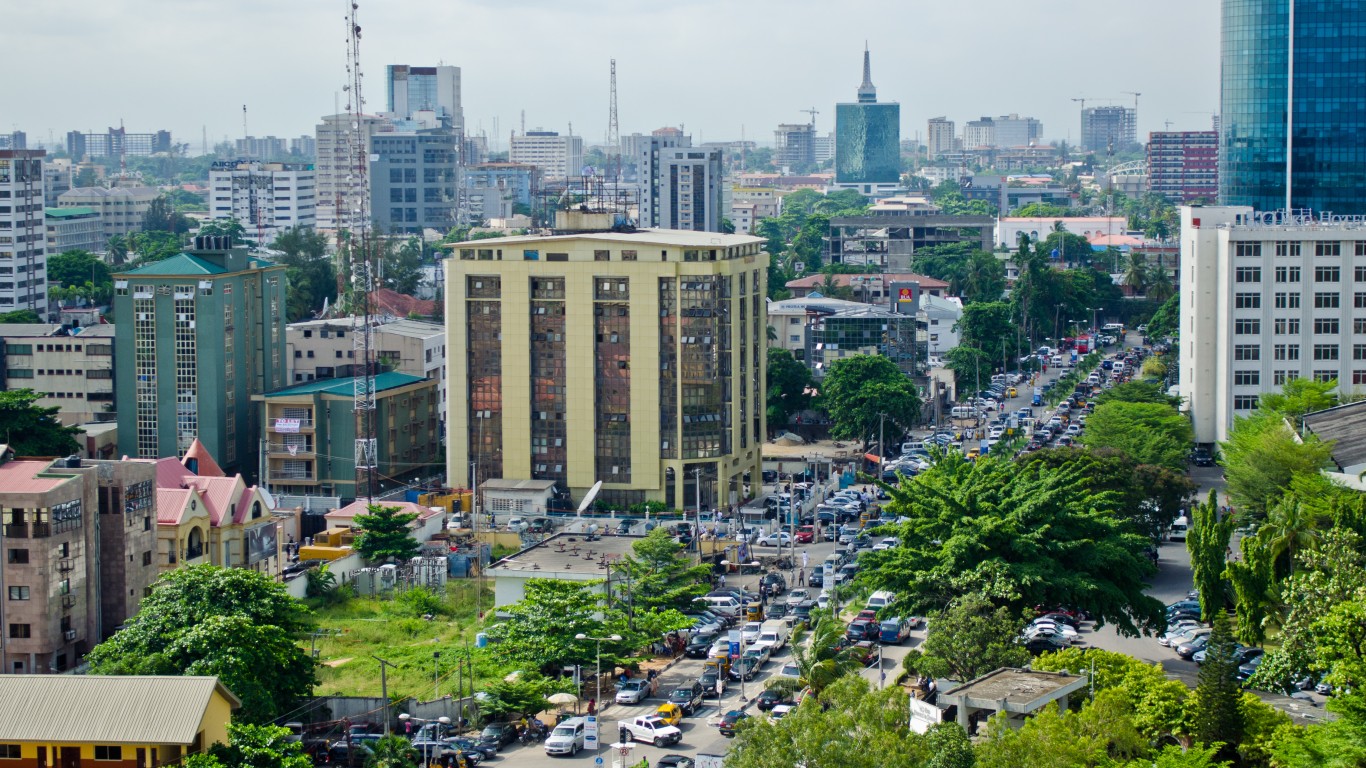
- Built up urban area, 2023: 998 square miles (or 2,585 square km)
- Estimated population, 2023: 14,540,000 — #27 largest of 986 urban areas
- Population density: 14,569 people per square mile (or 5,625 per sq km) — #394 densest of 986 urban areas
- World Bank geographical region: Sub-Saharan Africa
- Country class (World Bank): Lower middle income
37. Brisbane-Gold Coast, QLD-NSW, Australia
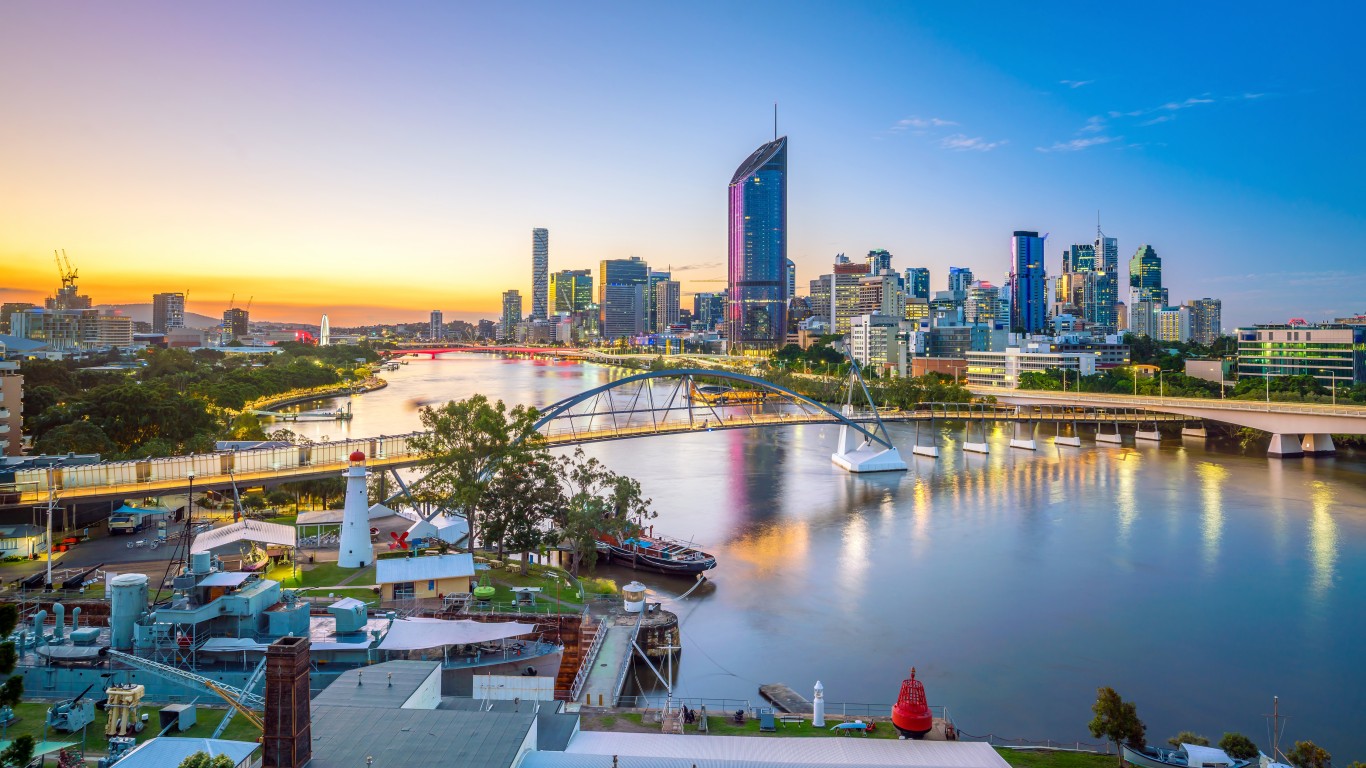
- Built up urban area, 2023: 1,022 square miles (or 2,647 square km)
- Estimated population, 2023: 3,039,000 — #177 largest of 986 urban areas
- Population density: 2,974 people per square mile (or 1,148 per sq km) — #944 densest of 986 urban areas
- World Bank geographical region: East Asia & Pacific
- Country class (World Bank): High income
36. Essen-Dusseldorf, Germany
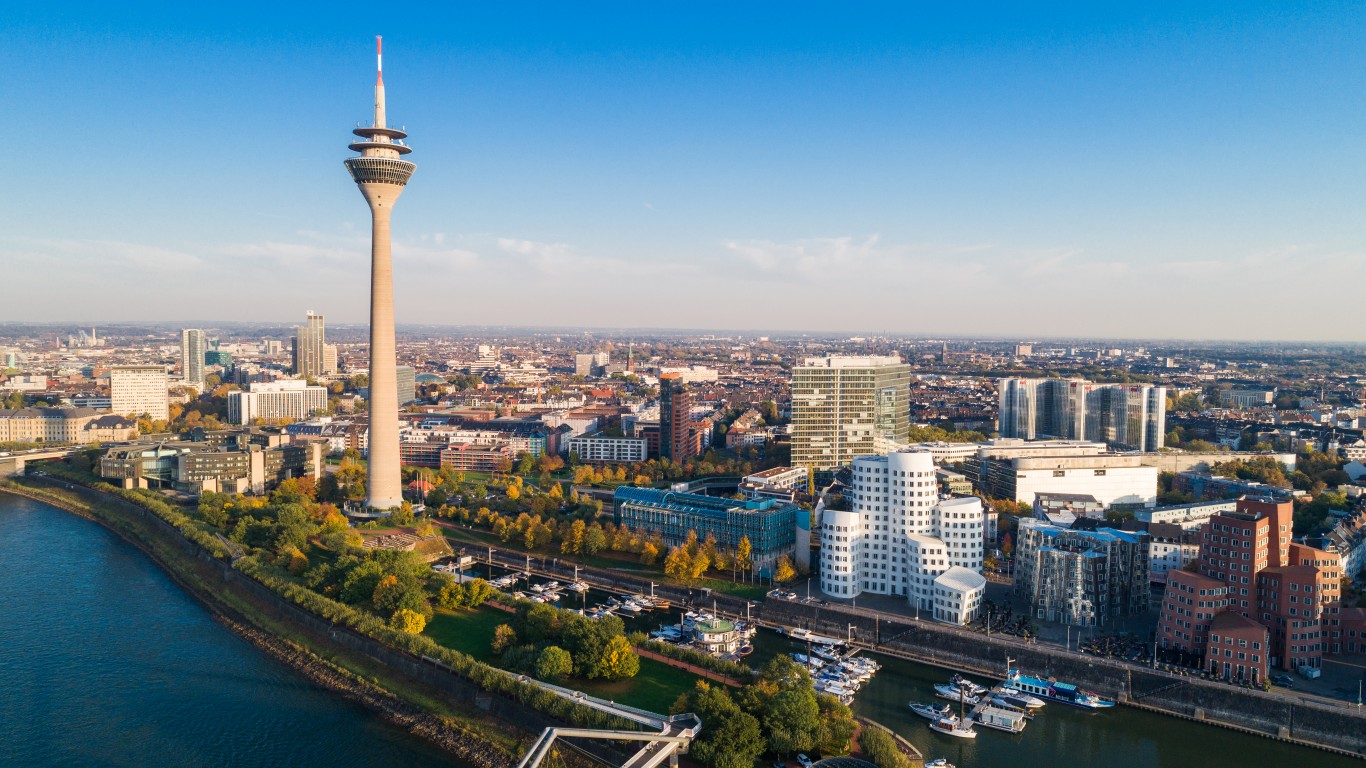
- Built up urban area, 2023: 1,036 square miles (or 2,683 square km)
- Estimated population, 2023: 6,769,000 — #69 largest of 986 urban areas
- Population density: 6,534 people per square mile (or 2,523 per sq km) — #822 densest of 986 urban areas
- World Bank geographical region: Europe & Central Asia
- Country class (World Bank): High income
35. Cairo, Egypt
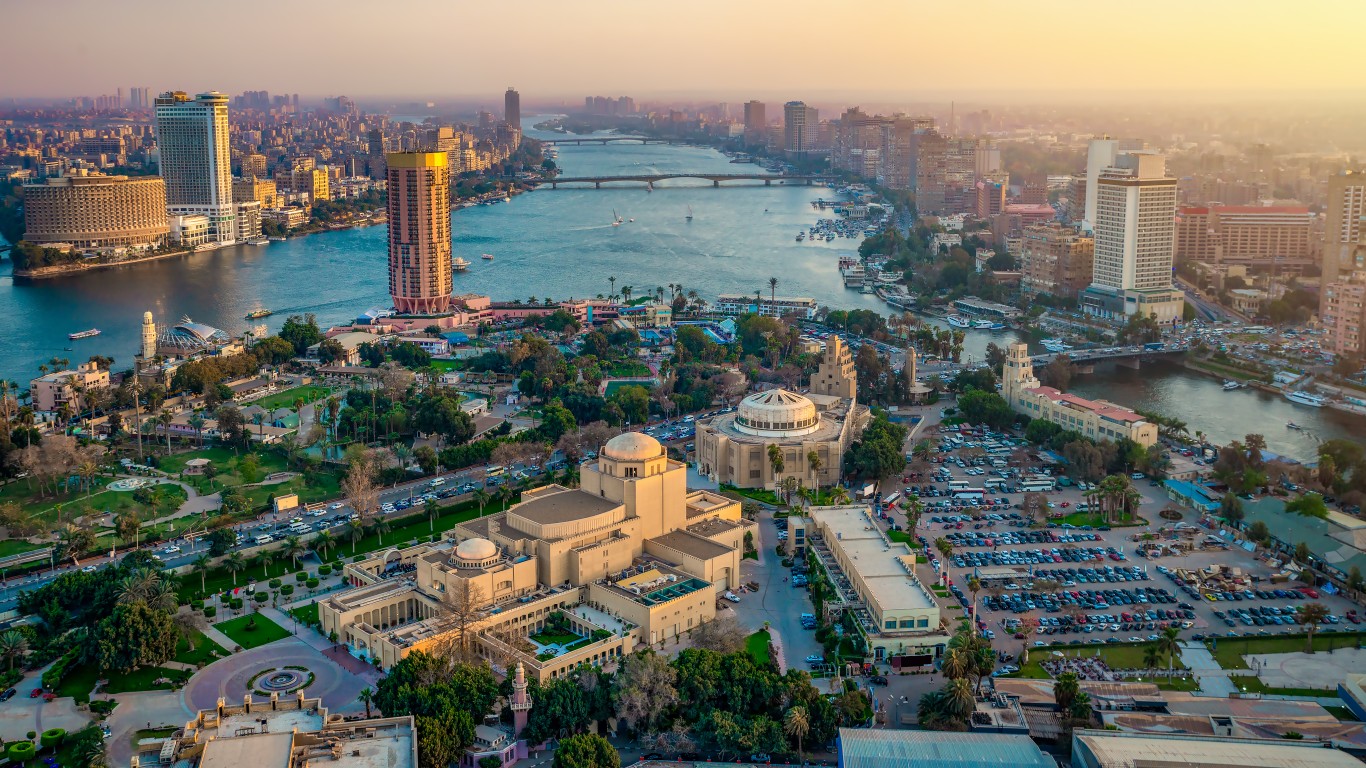
- Built up urban area, 2023: 1,041 square miles (or 2,696 square km)
- Estimated population, 2023: 22,679,000 — #9 largest of 986 urban areas
- Population density: 21,786 people per square mile (or 8,412 per sq km) — #221 densest of 986 urban areas
- World Bank geographical region: Middle East & North Africa
- Country class (World Bank): Lower middle income
34. Seoul-Incheon, South Korea

- Built up urban area, 2023: 1,069 square miles (or 2,769 square km)
- Estimated population, 2023: 23,225,000 — #8 largest of 986 urban areas
- Population density: 21,726 people per square mile (or 8,388 per sq km) — #223 densest of 986 urban areas
- World Bank geographical region: East Asia & Pacific
- Country class (World Bank): High income
33. Tianjin, TJ, China
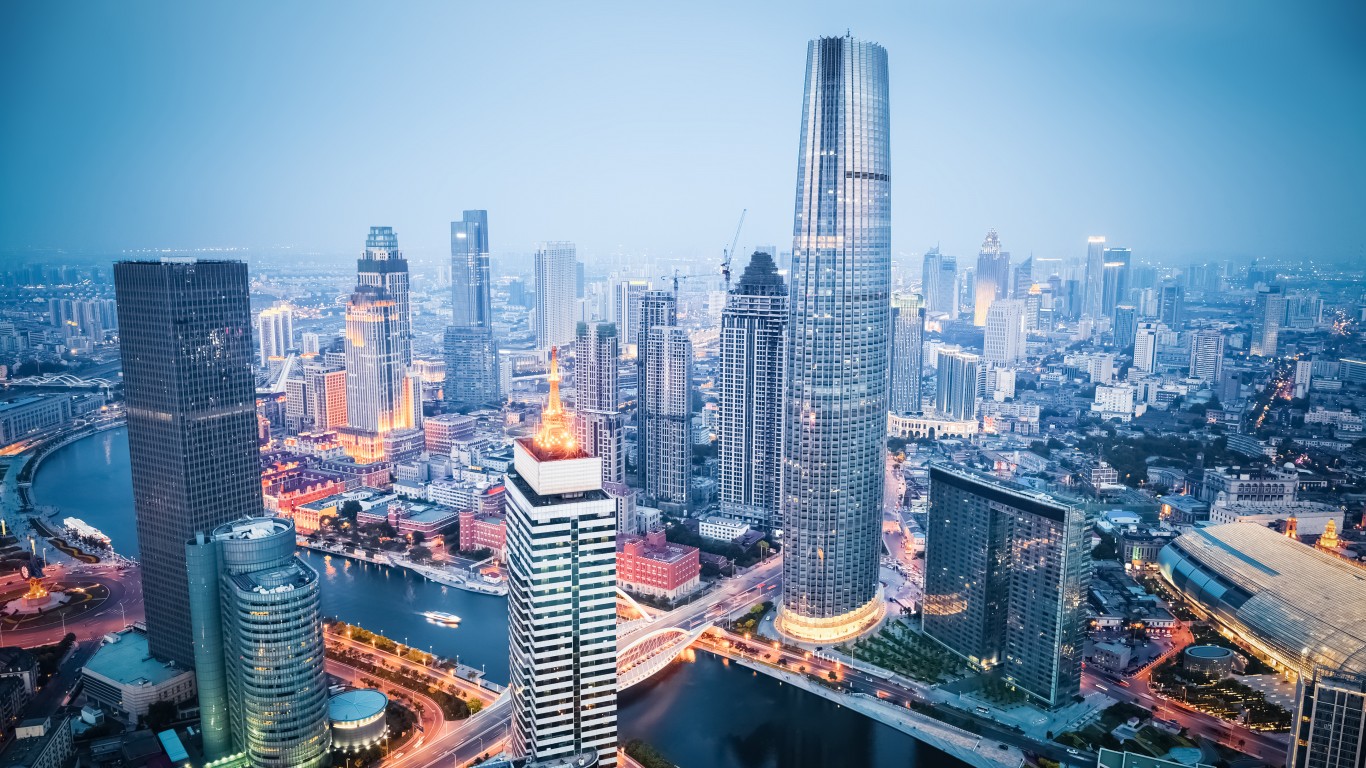
- Built up urban area, 2023: 1,086 square miles (or 2,813 square km)
- Estimated population, 2023: 10,047,000 — #44 largest of 986 urban areas
- Population density: 9,251 people per square mile (or 3,572 per sq km) — #655 densest of 986 urban areas
- World Bank geographical region: East Asia & Pacific
- Country class (World Bank): Upper middle income
32. Paris, France

- Built up urban area, 2023: 1,102 square miles (or 2,854 square km)
- Estimated population, 2023: 11,108,000 — #36 largest of 986 urban areas
- Population density: 10,084 people per square mile (or 3,893 per sq km) — #599 densest of 986 urban areas
- World Bank geographical region: Europe & Central Asia
- Country class (World Bank): High income
31. Melbourne, VIC, Australia
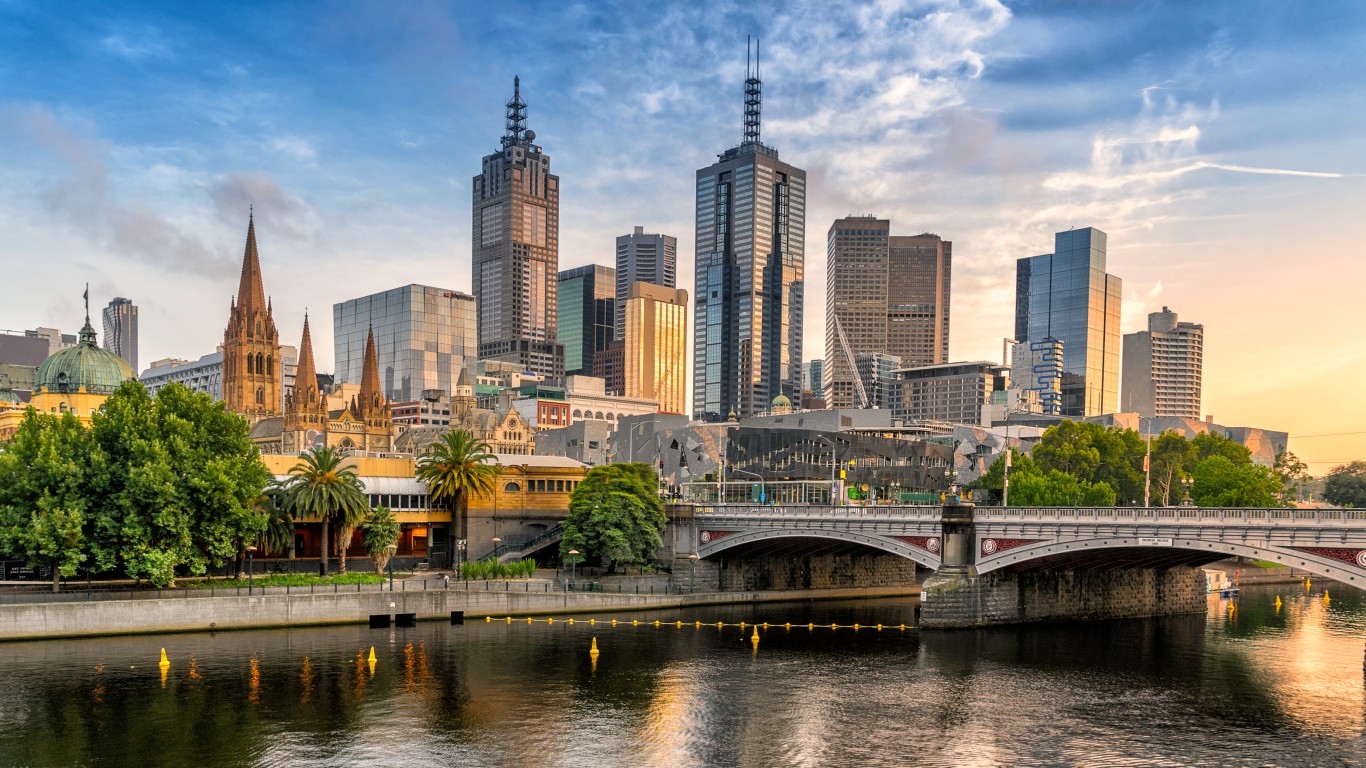
- Built up urban area, 2023: 1,112 square miles (or 2,880 square km)
- Estimated population, 2023: 4,709,000 — #106 largest of 986 urban areas
- Population density: 4,233 people per square mile (or 1,635 per sq km) — #910 densest of 986 urban areas
- World Bank geographical region: East Asia & Pacific
- Country class (World Bank): High income
30. Tampa-St. Petersburg, FL, United States
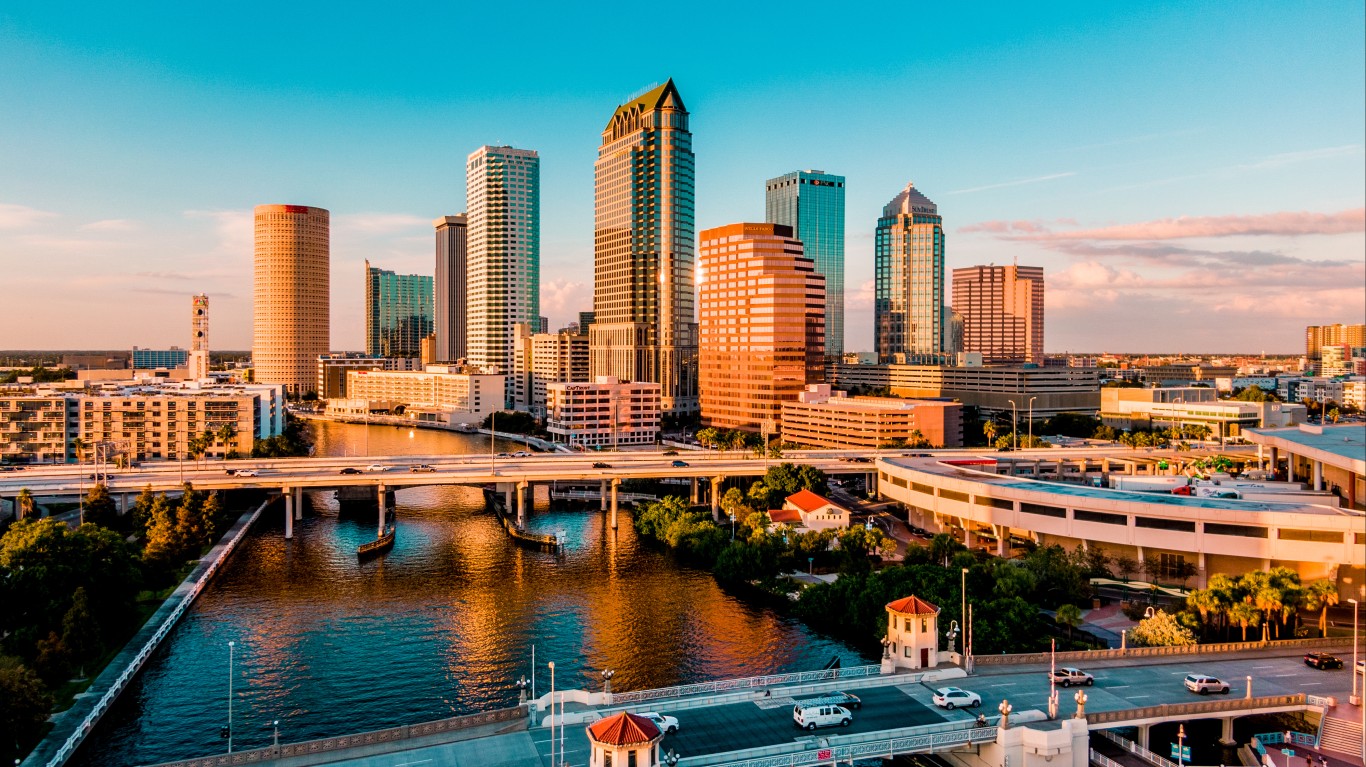
- Built up urban area, 2023: 1,157 square miles (or 2,997 square km)
- Estimated population, 2023: 3,203,000 — #169 largest of 986 urban areas
- Population density: 2,769 people per square mile (or 1,069 per sq km) — #949 densest of 986 urban areas
- World Bank geographical region: North America
- Country class (World Bank): High income
29. Osaka-Kobe-Kyoto, Japan

- Built up urban area, 2023: 1,166 square miles (or 3,020 square km)
- Estimated population, 2023: 14,916,000 — #26 largest of 986 urban areas
- Population density: 12,792 people per square mile (or 4,939 per sq km) — #461 densest of 986 urban areas
- World Bank geographical region: East Asia & Pacific
- Country class (World Bank): High income
28. Seattle, WA, United States

- Built up urban area, 2023: 1,209 square miles (or 3,131 square km)
- Estimated population, 2023: 4,001,000 — #136 largest of 986 urban areas
- Population density: 3,310 people per square mile (or 1,278 per sq km) — #934 densest of 986 urban areas
- World Bank geographical region: North America
- Country class (World Bank): High income
27. Orlando, FL, United States
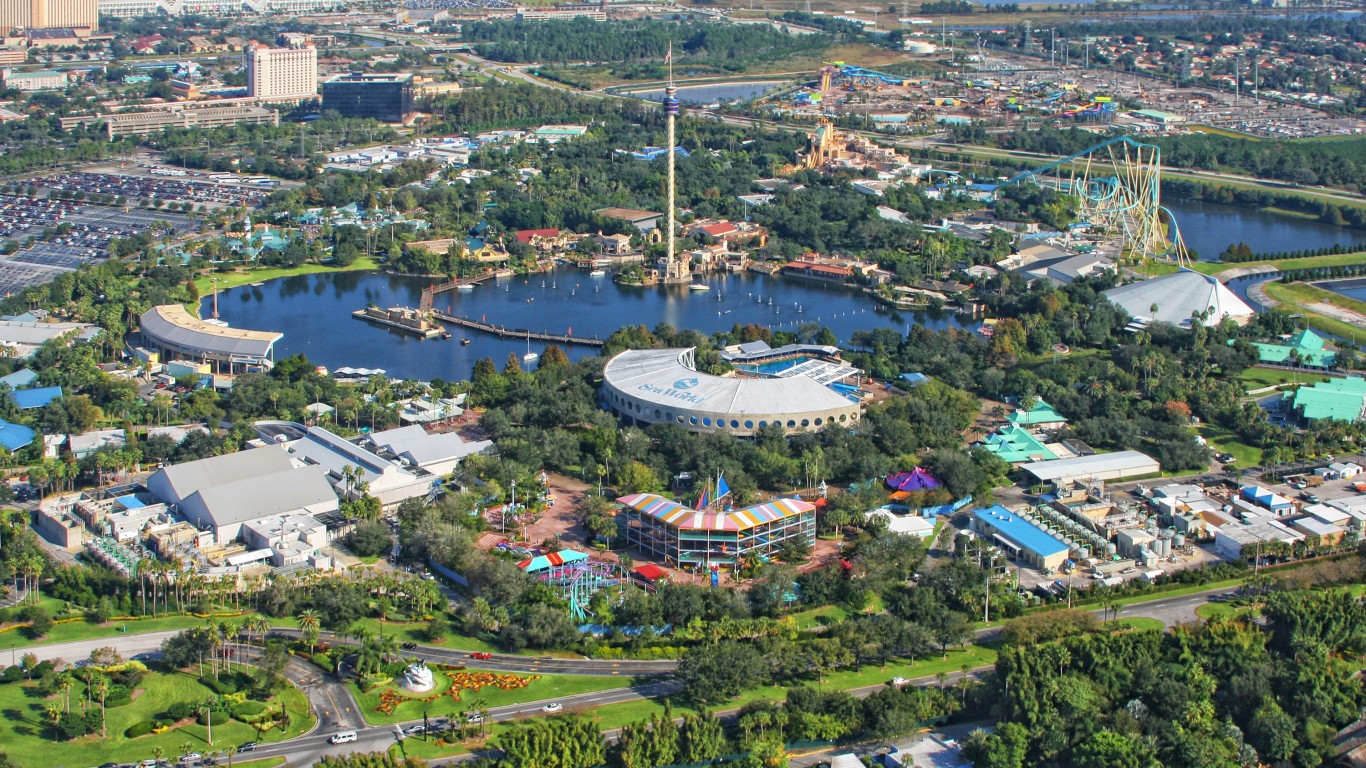
- Built up urban area, 2023: 1,214 square miles (or 3,144 square km)
- Estimated population, 2023: 3,075,000 — #175 largest of 986 urban areas
- Population density: 2,532 people per square mile (or 978 per sq km) — #952 densest of 986 urban areas
- World Bank geographical region: North America
- Country class (World Bank): High income
26. Bangkok, Thailand
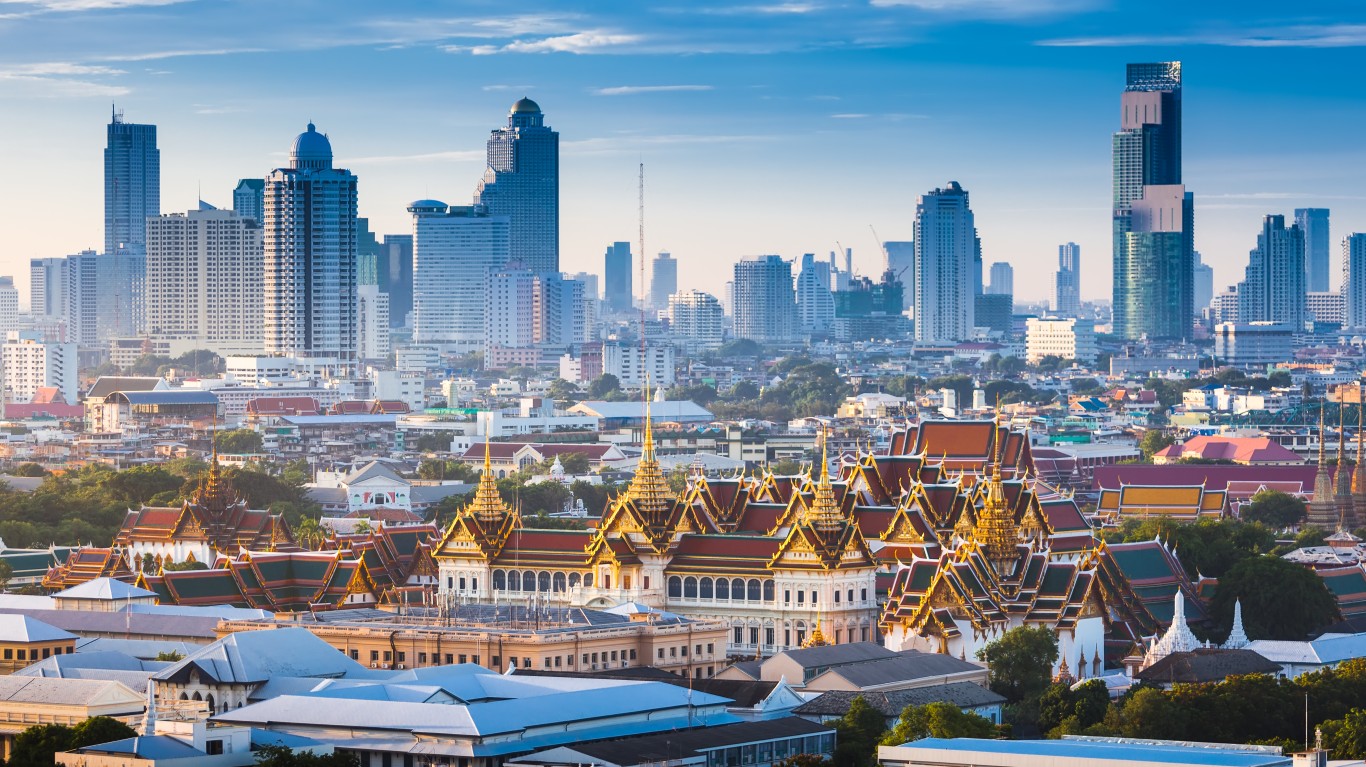
- Built up urban area, 2023: 1,235 square miles (or 3,199 square km)
- Estimated population, 2023: 18,884,000 — #16 largest of 986 urban areas
- Population density: 15,291 people per square mile (or 5,904 per sq km) — #368 densest of 986 urban areas
- World Bank geographical region: East Asia & Pacific
- Country class (World Bank): Upper middle income
25. Miami, FL, United States
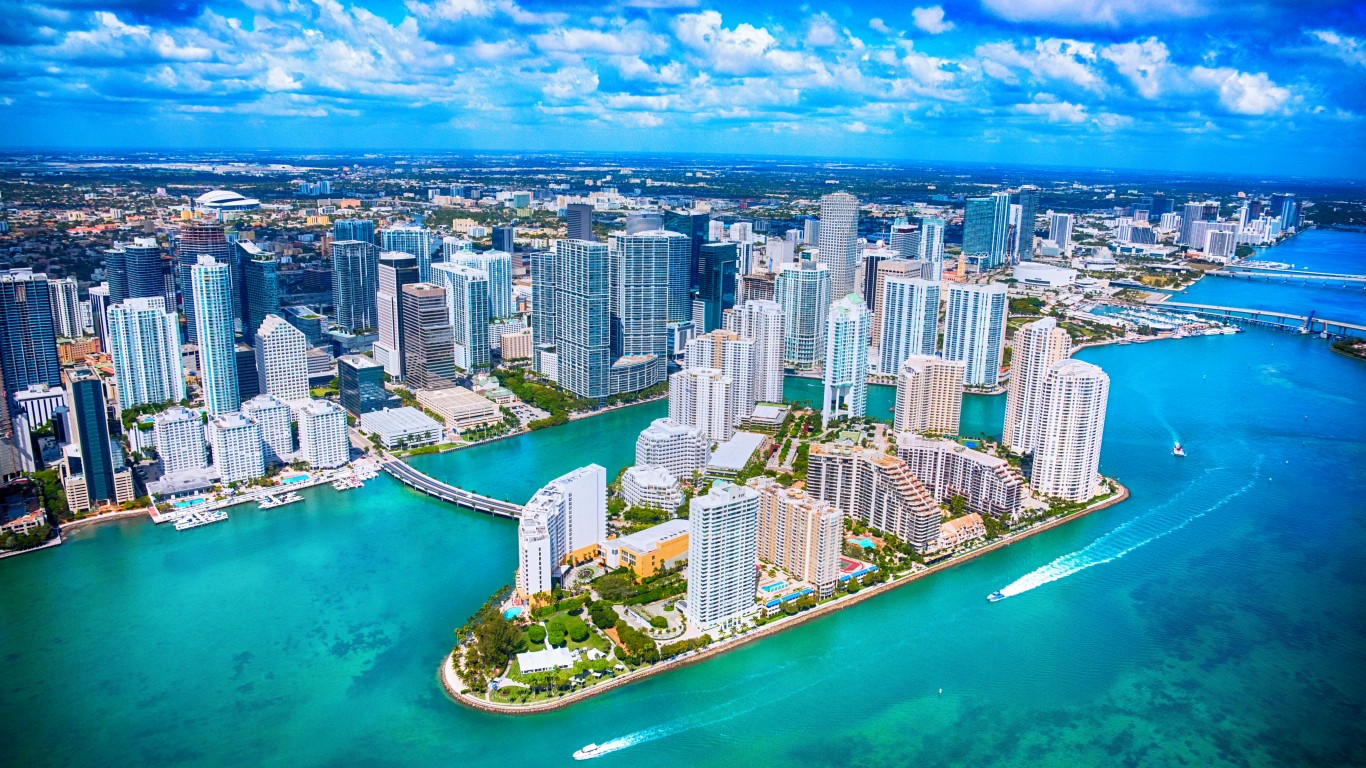
- Built up urban area, 2023: 1,244 square miles (or 3,222 square km)
- Estimated population, 2023: 6,139,000 — #80 largest of 986 urban areas
- Population density: 4,934 people per square mile (or 1,905 per sq km) — #892 densest of 986 urban areas
- World Bank geographical region: North America
- Country class (World Bank): High income
24. Phoenix, AZ, United States
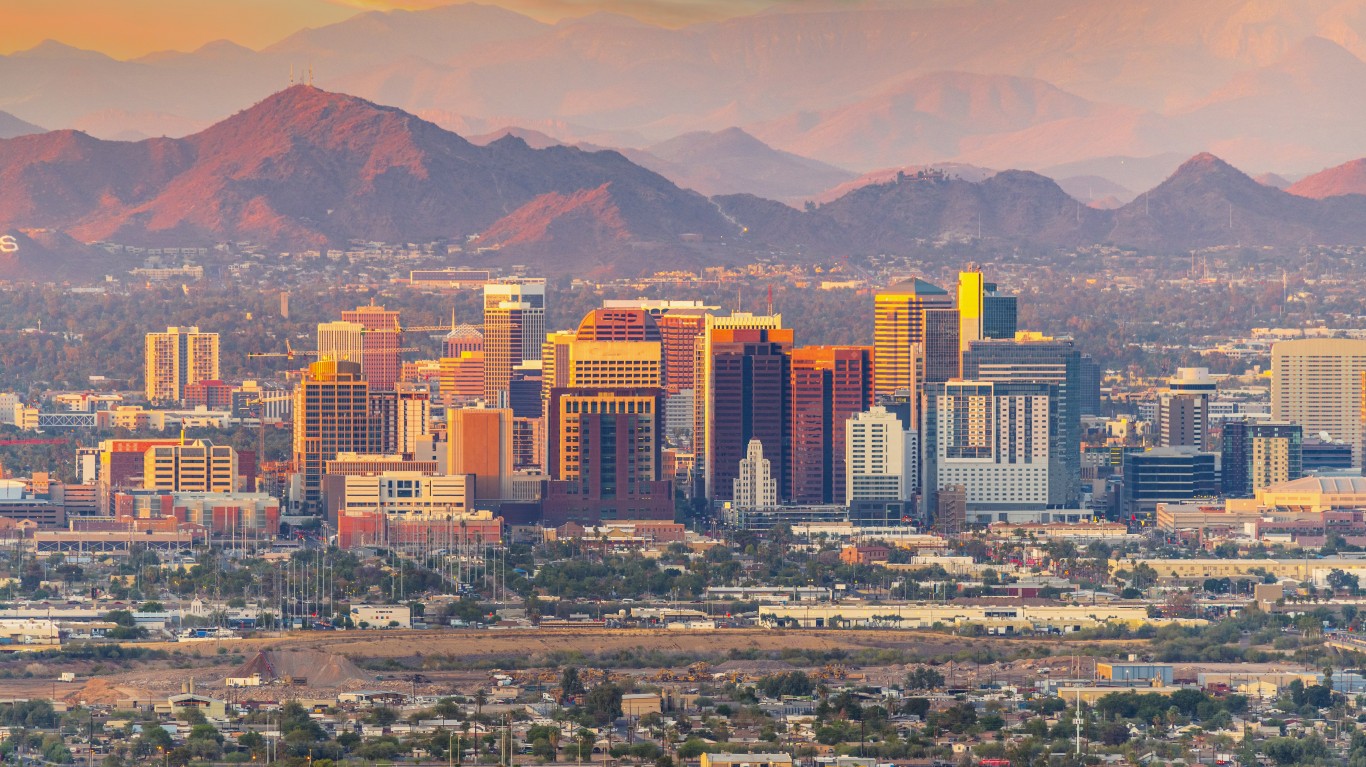
- Built up urban area, 2023: 1,249 square miles (or 3,235 square km)
- Estimated population, 2023: 4,617,000 — #112 largest of 986 urban areas
- Population density: 3,697 people per square mile (or 1,428 per sq km) — #923 densest of 986 urban areas
- World Bank geographical region: North America
- Country class (World Bank): High income
23. Buenos Aires, Argentina
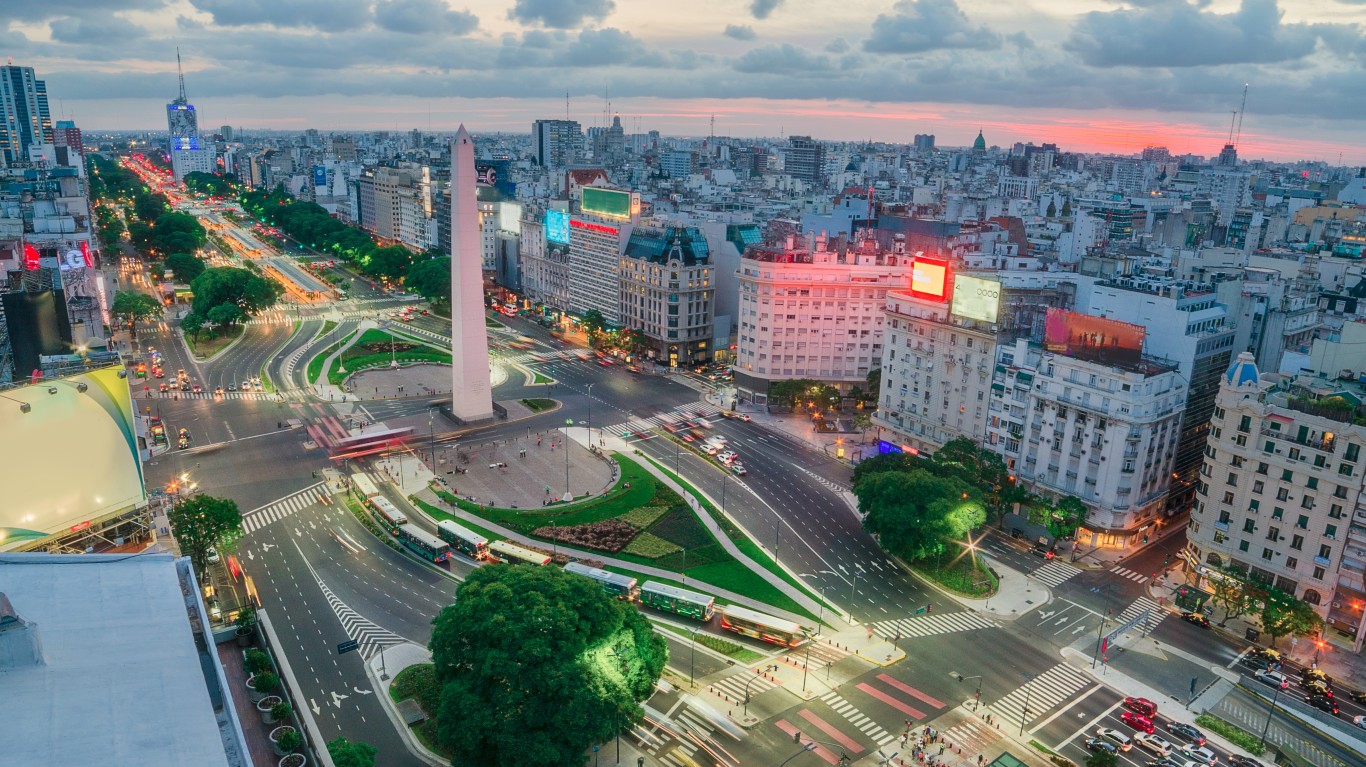
- Built up urban area, 2023: 1,327 square miles (or 3,437 square km)
- Estimated population, 2023: 15,748,000 — #20 largest of 986 urban areas
- Population density: 11,867 people per square mile (or 4,582 per sq km) — #501 densest of 986 urban areas
- World Bank geographical region: Latin America & Caribbean
- Country class (World Bank): Upper middle income
22. Jakarta, Indonesia
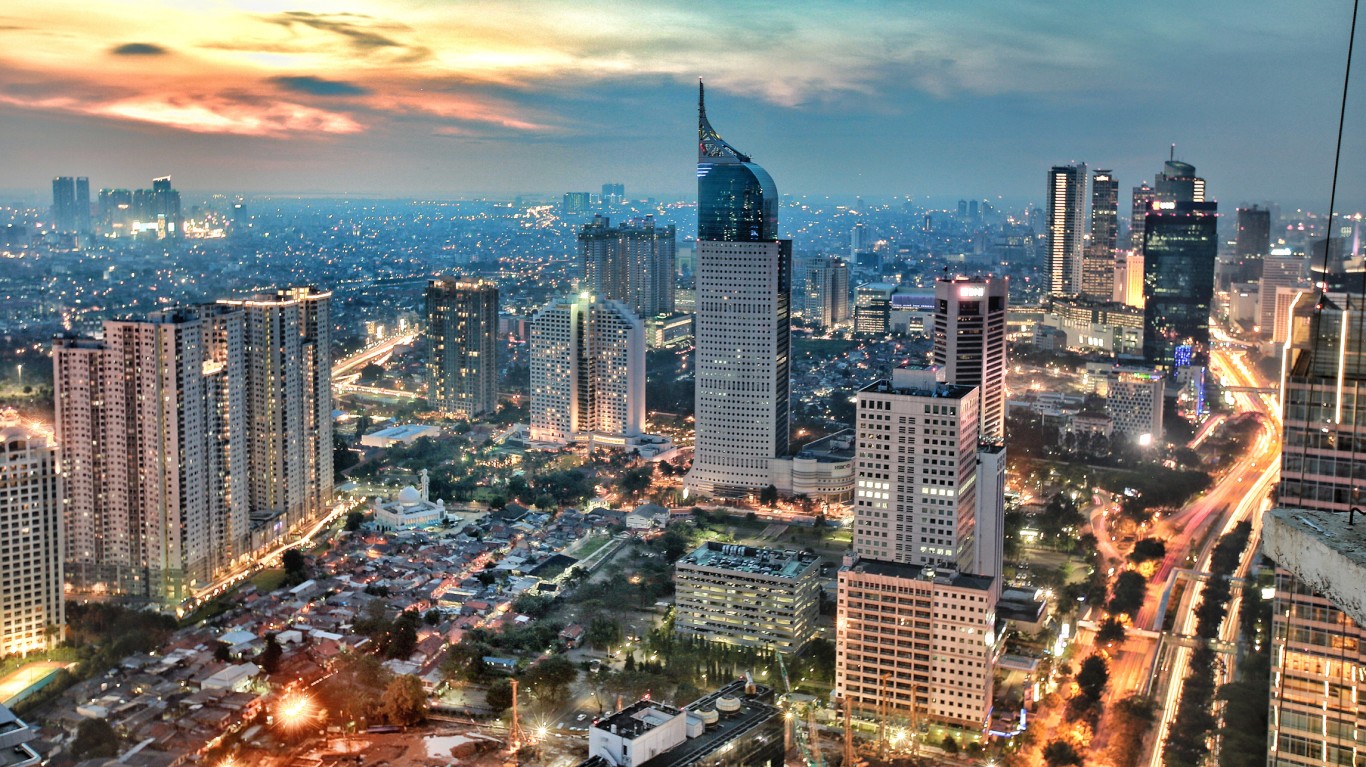
- Built up urban area, 2023: 1,369 square miles (or 3,546 square km)
- Estimated population, 2023: 35,386,000 — #2 largest of 986 urban areas
- Population density: 25,848 people per square mile (or 9,980 per sq km) — #162 densest of 986 urban areas
- World Bank geographical region: East Asia & Pacific
- Country class (World Bank): Upper middle income
21. Cleveland, OH, United States

- Built up urban area, 2023: 1,393 square miles (or 3,608 square km)
- Estimated population, 2023: 2,871,000 — #186 largest of 986 urban areas
- Population density: 2,061 people per square mile (or 796 per sq km) — #973 densest of 986 urban areas
- World Bank geographical region: North America
- Country class (World Bank): High income
20. Charlotte, NC-SC, United States

- Built up urban area, 2023: 1,402 square miles (or 3,631 square km)
- Estimated population, 2023: 2,879,000 — #184 largest of 986 urban areas
- Population density: 2,054 people per square mile (or 793 per sq km) — #974 densest of 986 urban areas
- World Bank geographical region: North America
- Country class (World Bank): High income
19. San Francisco-San Jose, CA, United States

- Built up urban area, 2023: 1,403 square miles (or 3,634 square km)
- Estimated population, 2023: 6,844,000 — #65 largest of 986 urban areas
- Population density: 4,877 people per square mile (or 1,883 per sq km) — #896 densest of 986 urban areas
- World Bank geographical region: North America
- Country class (World Bank): High income
18. Sao Paulo, Brazil
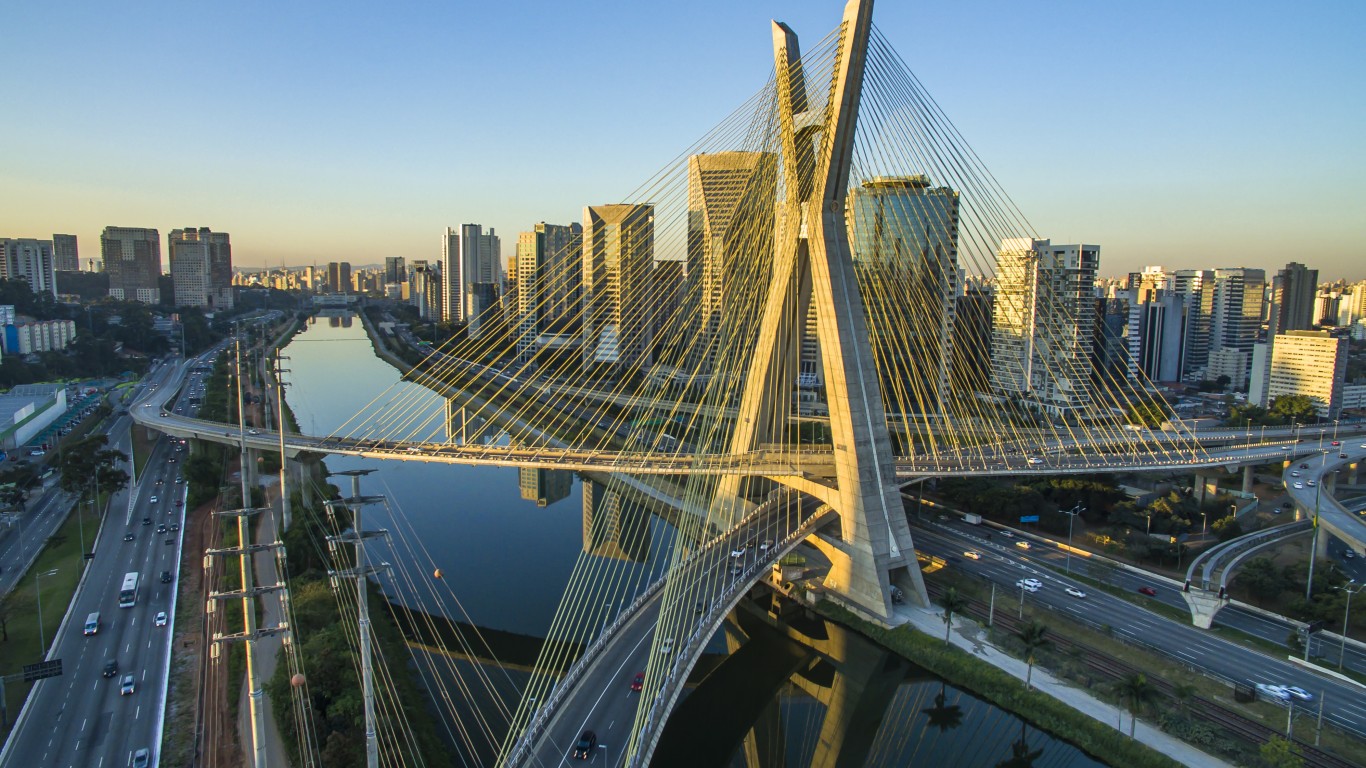
- Built up urban area, 2023: 1,409 square miles (or 3,649 square km)
- Estimated population, 2023: 21,486,000 — #12 largest of 986 urban areas
- Population density: 15,249 people per square mile (or 5,888 per sq km) — #369 densest of 986 urban areas
- World Bank geographical region: Latin America & Caribbean
- Country class (World Bank): Upper middle income
17. Nagoya, Japan

- Built up urban area, 2023: 1,430 square miles (or 3,704 square km)
- Estimated population, 2023: 9,439,000 — #48 largest of 986 urban areas
- Population density: 6,601 people per square mile (or 2,549 per sq km) — #820 densest of 986 urban areas
- World Bank geographical region: East Asia & Pacific
- Country class (World Bank): High income
16. Johannesburg-Pretoria, South Africa
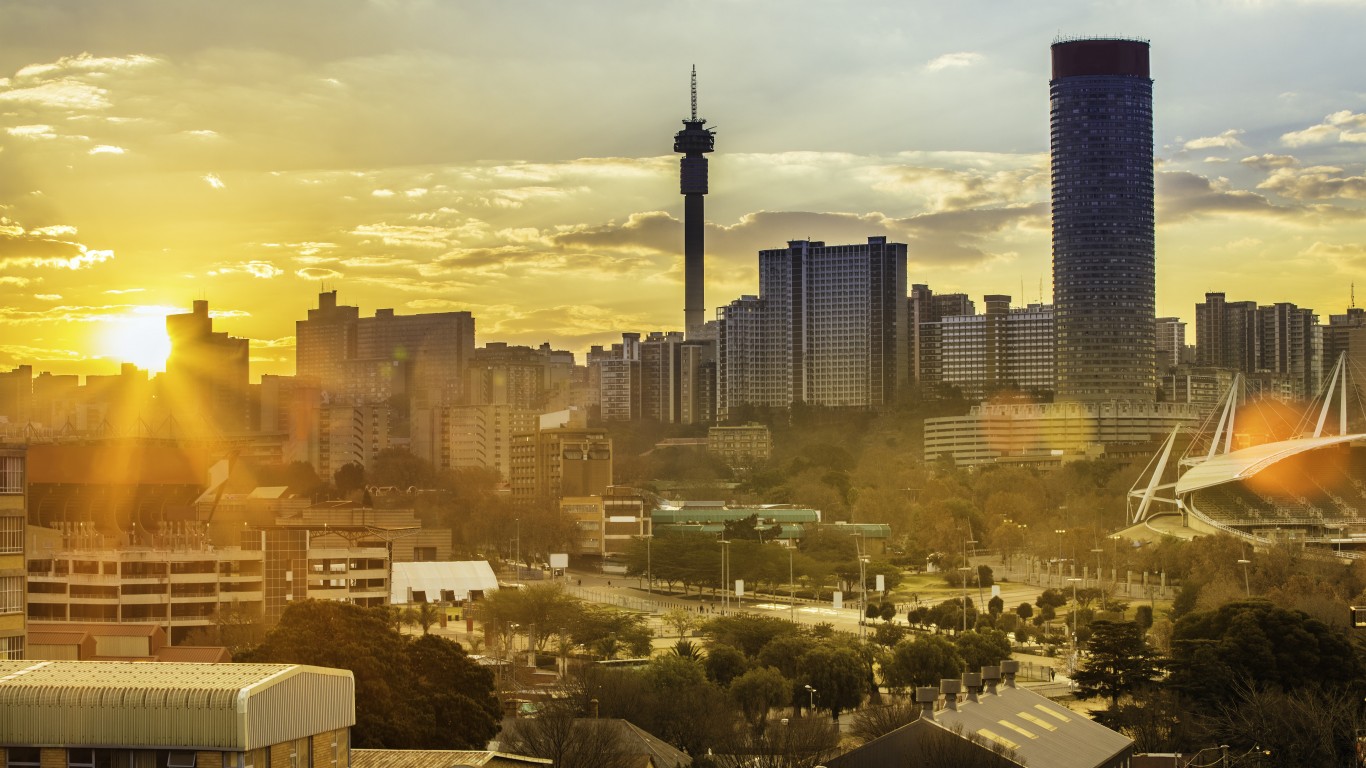
- Built up urban area, 2023: 1,560 square miles (or 4,040 square km)
- Estimated population, 2023: 15,551,000 — #22 largest of 986 urban areas
- Population density: 9,969 people per square mile (or 3,849 per sq km) — #605 densest of 986 urban areas
- World Bank geographical region: Sub-Saharan Africa
- Country class (World Bank): Upper middle income
15. Detroit, MI, United States
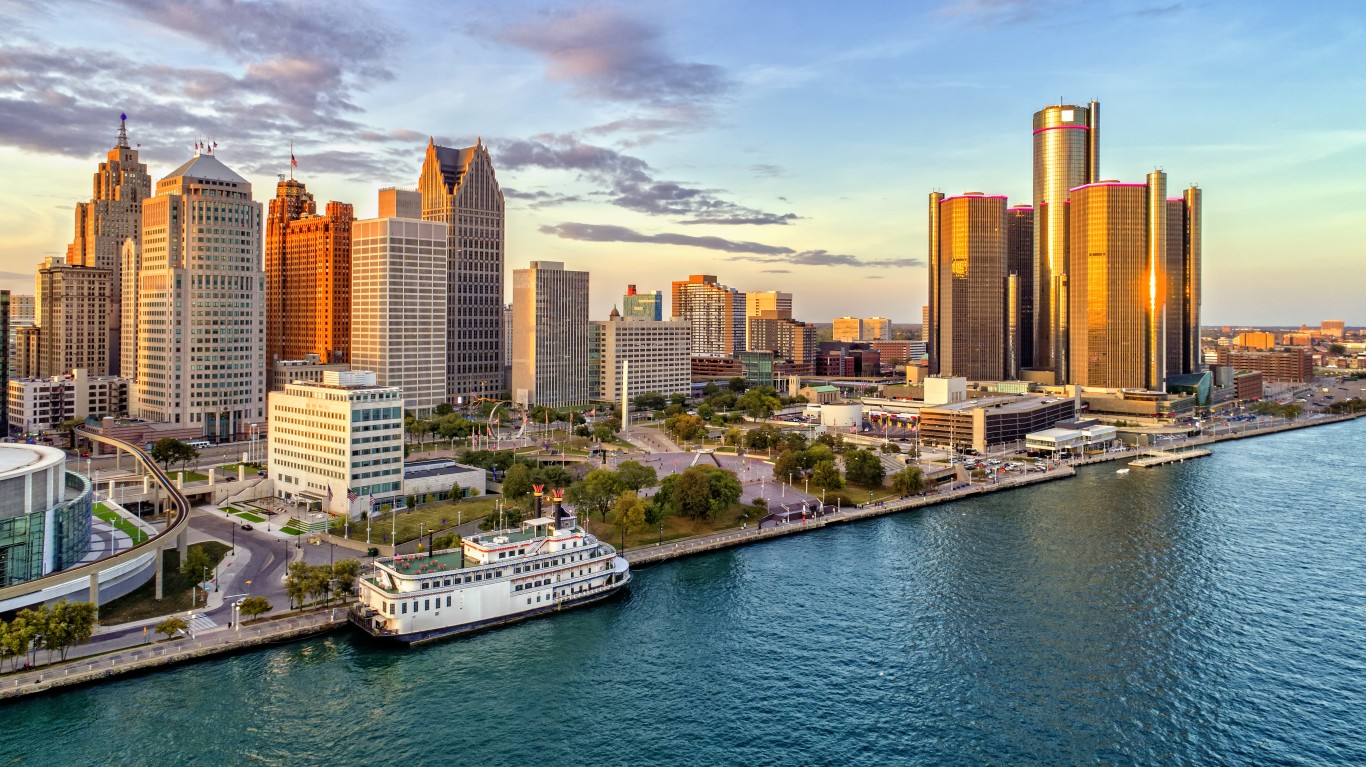
- Built up urban area, 2023: 1,576 square miles (or 4,082 square km)
- Estimated population, 2023: 4,258,000 — #125 largest of 986 urban areas
- Population density: 2,701 people per square mile (or 1,043 per sq km) — #950 densest of 986 urban areas
- World Bank geographical region: North America
- Country class (World Bank): High income
14. Beijing, BJ-HEB, China
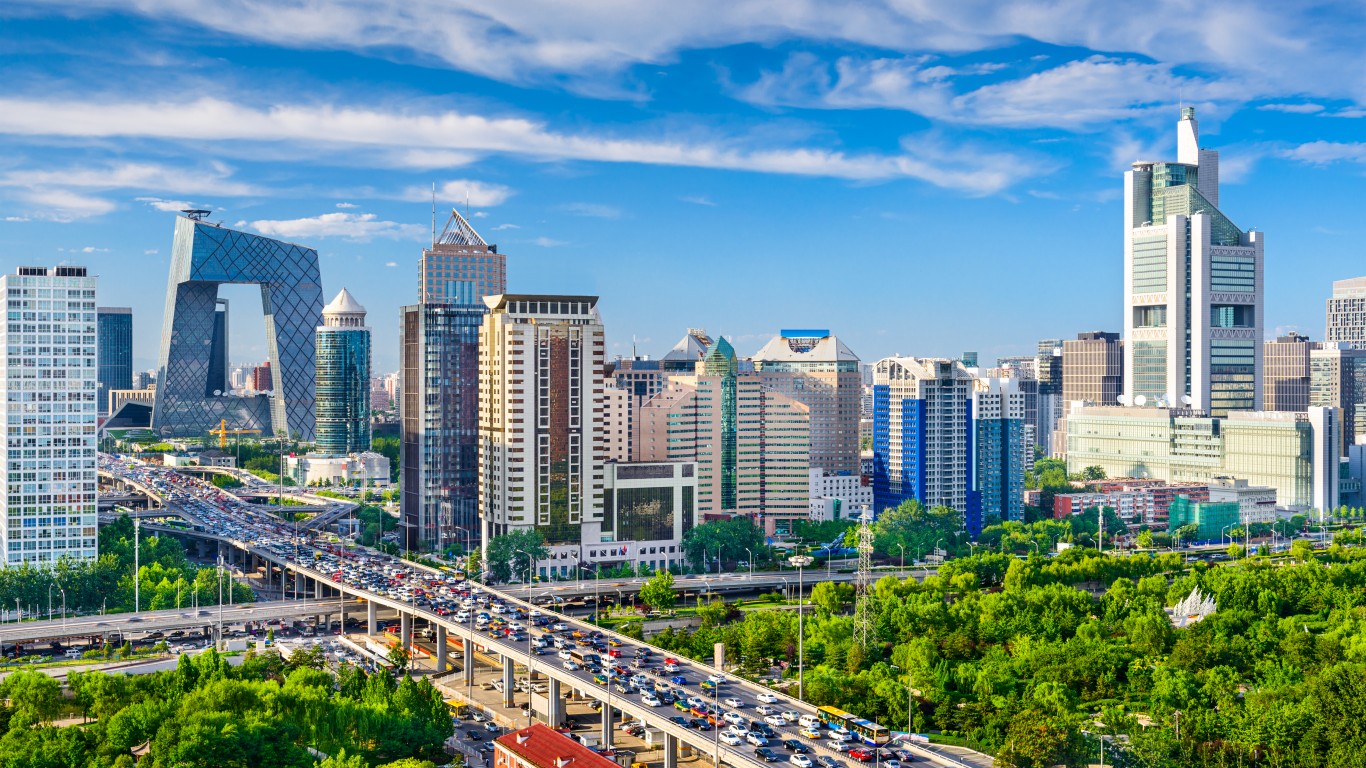
- Built up urban area, 2023: 1,654 square miles (or 4,284 square km)
- Estimated population, 2023: 18,883,000 — #17 largest of 986 urban areas
- Population density: 11,417 people per square mile (or 4,408 per sq km) — #526 densest of 986 urban areas
- World Bank geographical region: East Asia & Pacific
- Country class (World Bank): Upper middle income
13. Shanghai, SHG-JS-ZJ, China

- Built up urban area, 2023: 1,673 square miles (or 4,333 square km)
- Estimated population, 2023: 24,042,000 — #7 largest of 986 urban areas
- Population density: 14,371 people per square mile (or 5,549 per sq km) — #401 densest of 986 urban areas
- World Bank geographical region: East Asia & Pacific
- Country class (World Bank): Upper middle income
12. Guangzhou-Foshan, GD, China
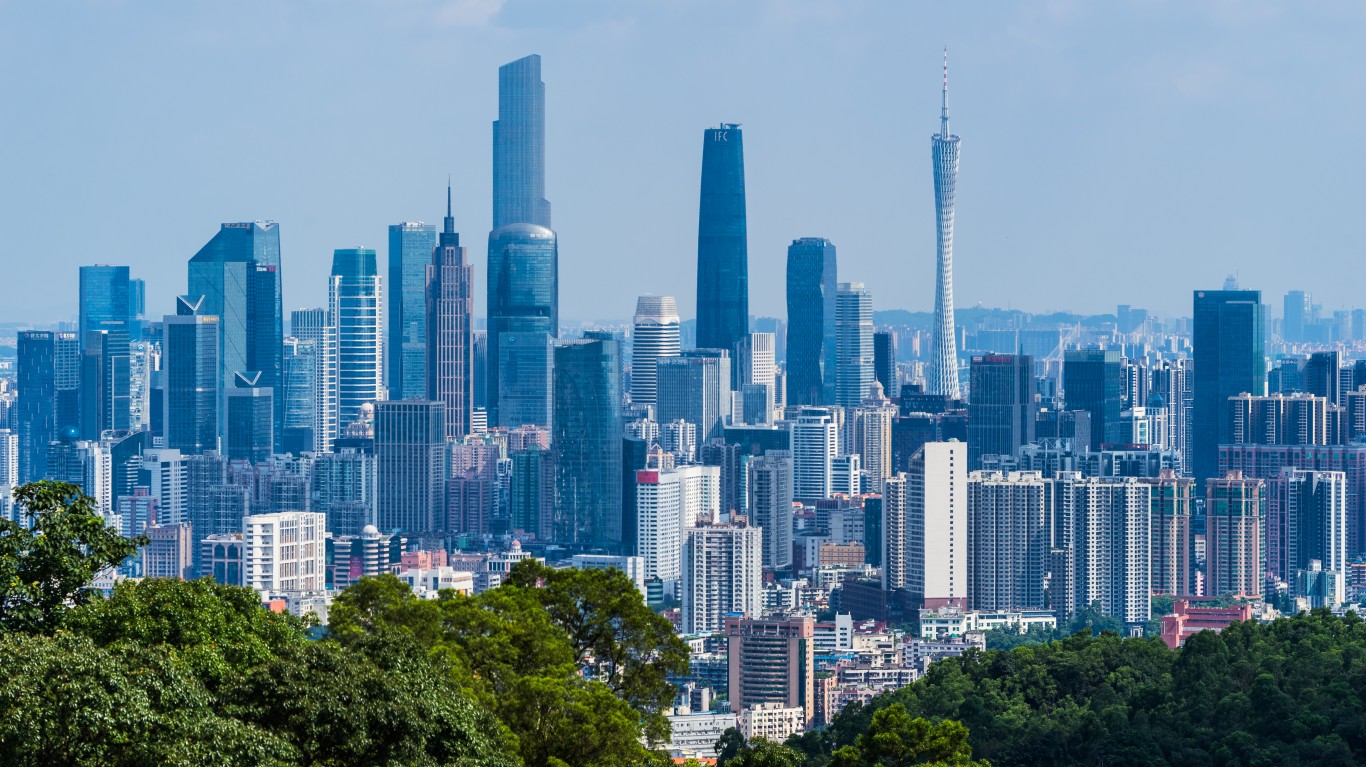
- Built up urban area, 2023: 1,754 square miles (or 4,543 square km)
- Estimated population, 2023: 27,119,000 — #4 largest of 986 urban areas
- Population density: 15,461 people per square mile (or 5,970 per sq km) — #360 densest of 986 urban areas
- World Bank geographical region: East Asia & Pacific
- Country class (World Bank): Upper middle income
11. Philadelphia, PA-NJ-DE-MD, United States

- Built up urban area, 2023: 1,898 square miles (or 4,916 square km)
- Estimated population, 2023: 5,795,000 — #83 largest of 986 urban areas
- Population density: 3,053 people per square mile (or 1,179 per sq km) — #941 densest of 986 urban areas
- World Bank geographical region: North America
- Country class (World Bank): High income
10. Dallas-Fort Worth, TX, United States
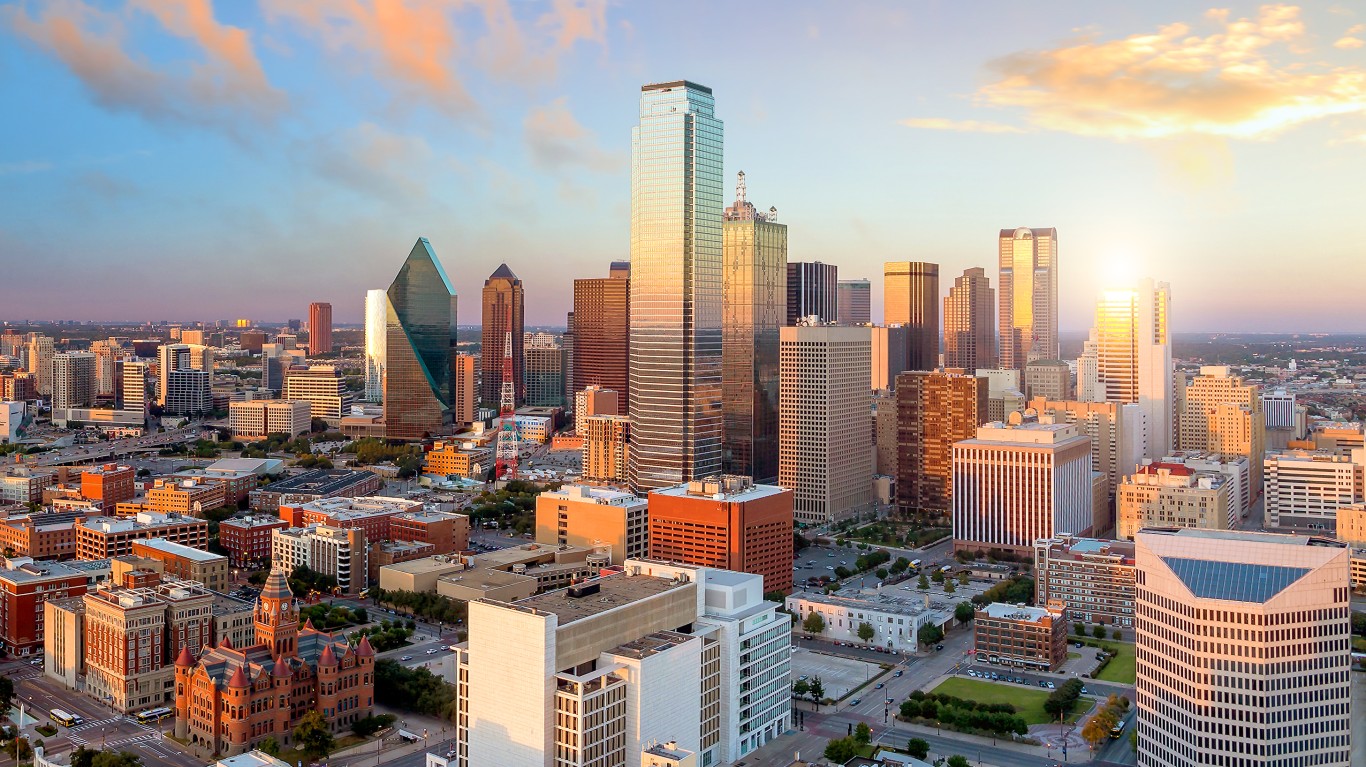
- Built up urban area, 2023: 2,049 square miles (or 5,307 square km)
- Estimated population, 2023: 6,979,000 — #63 largest of 986 urban areas
- Population density: 3,406 people per square mile (or 1,315 per sq km) — #929 densest of 986 urban areas
- World Bank geographical region: North America
- Country class (World Bank): High income
9. Houston, TX, United States
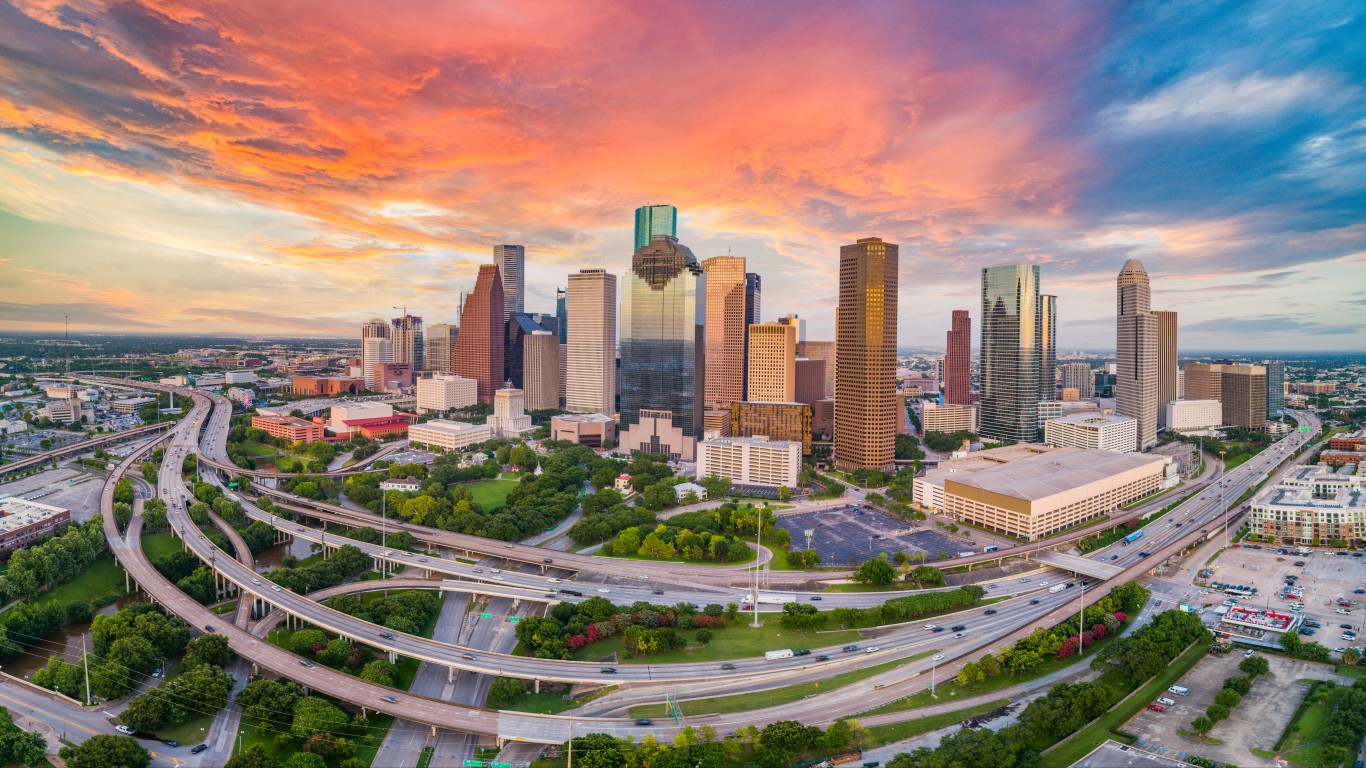
- Built up urban area, 2023: 2,081 square miles (or 5,390 square km)
- Estimated population, 2023: 6,703,000 — #71 largest of 986 urban areas
- Population density: 3,221 people per square mile (or 1,244 per sq km) — #935 densest of 986 urban areas
- World Bank geographical region: North America
- Country class (World Bank): High income
8. Washington-Baltimore, DC-VA-MD, United States
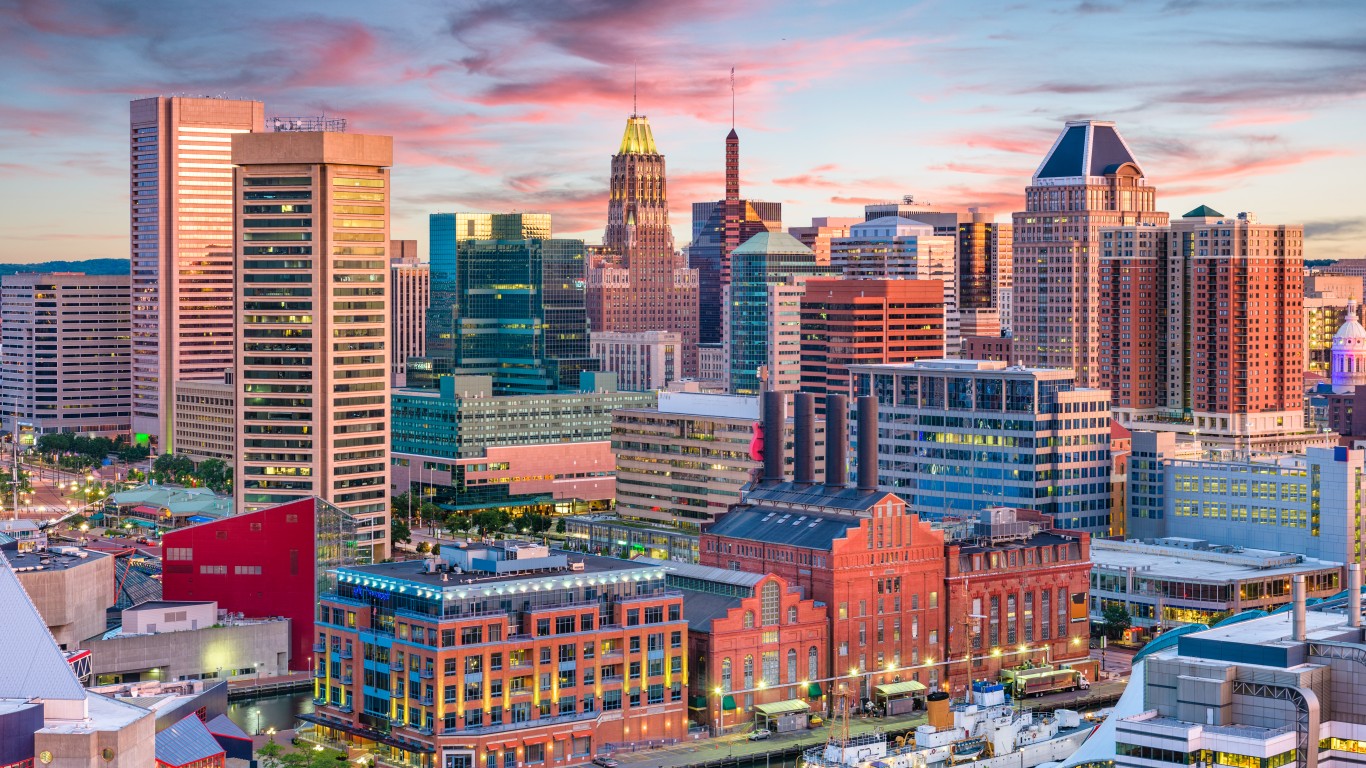
- Built up urban area, 2023: 2,162 square miles (or 5,600 square km)
- Estimated population, 2023: 7,853,000 — #56 largest of 986 urban areas
- Population density: 3,632 people per square mile (or 1,402 per sq km) — #926 densest of 986 urban areas
- World Bank geographical region: North America
- Country class (World Bank): High income
7. Chicago, IL-IN-WI, United States
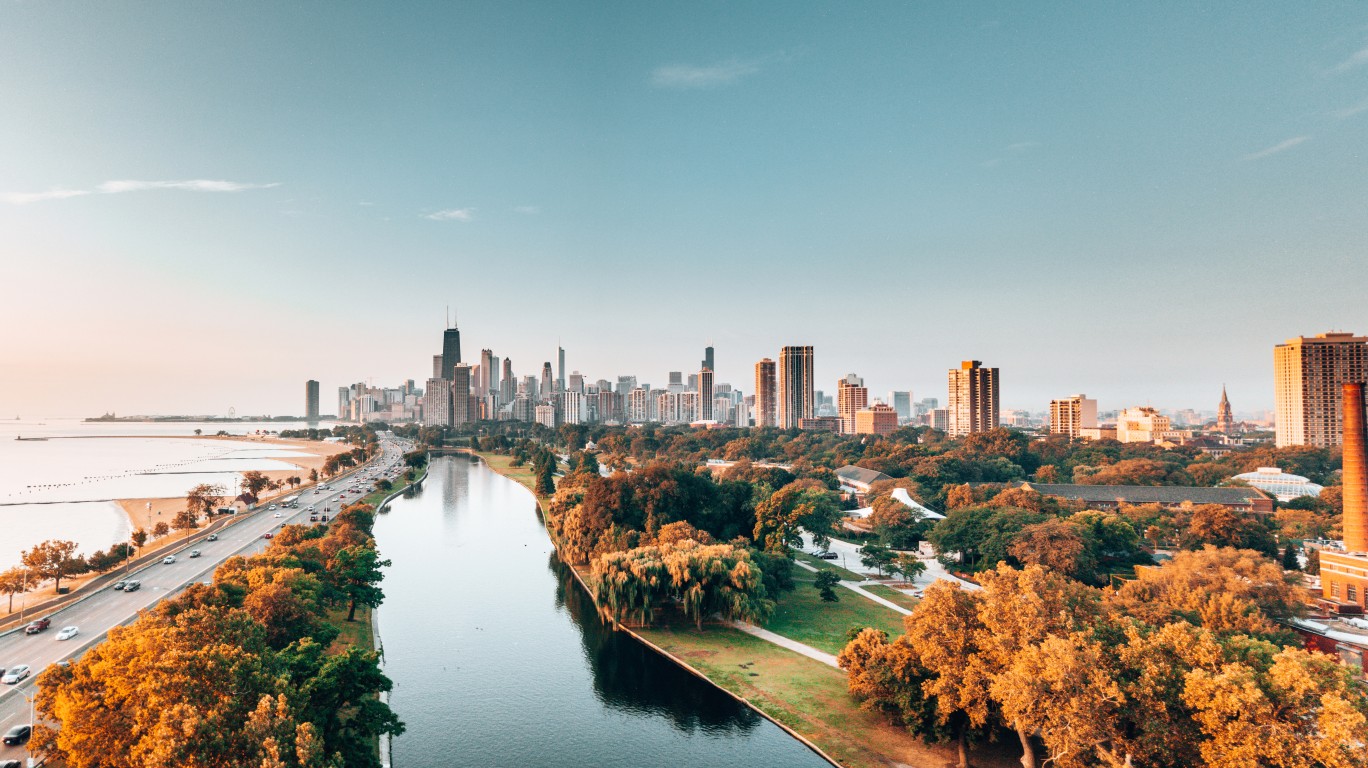
- Built up urban area, 2023: 2,522 square miles (or 6,532 square km)
- Estimated population, 2023: 8,954,000 — #50 largest of 986 urban areas
- Population density: 3,551 people per square mile (or 1,371 per sq km) — #927 densest of 986 urban areas
- World Bank geographical region: North America
- Country class (World Bank): High income
6. Moscow, Russia
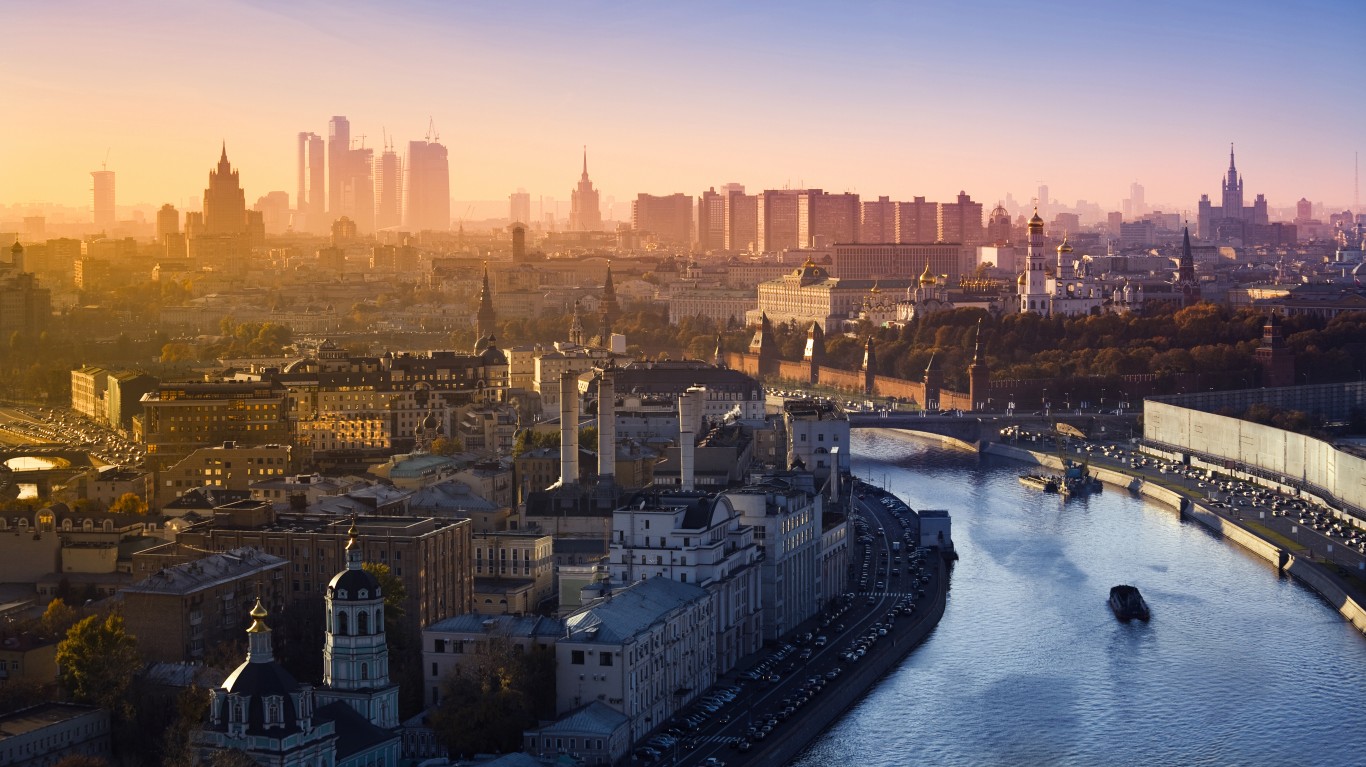
- Built up urban area, 2023: 2,565 square miles (or 6,643 square km)
- Estimated population, 2023: 17,878,000 — #18 largest of 986 urban areas
- Population density: 6,970 people per square mile (or 2,691 per sq km) — #791 densest of 986 urban areas
- World Bank geographical region: Europe & Central Asia
- Country class (World Bank): Upper middle income
5. Los Angeles, CA, United States
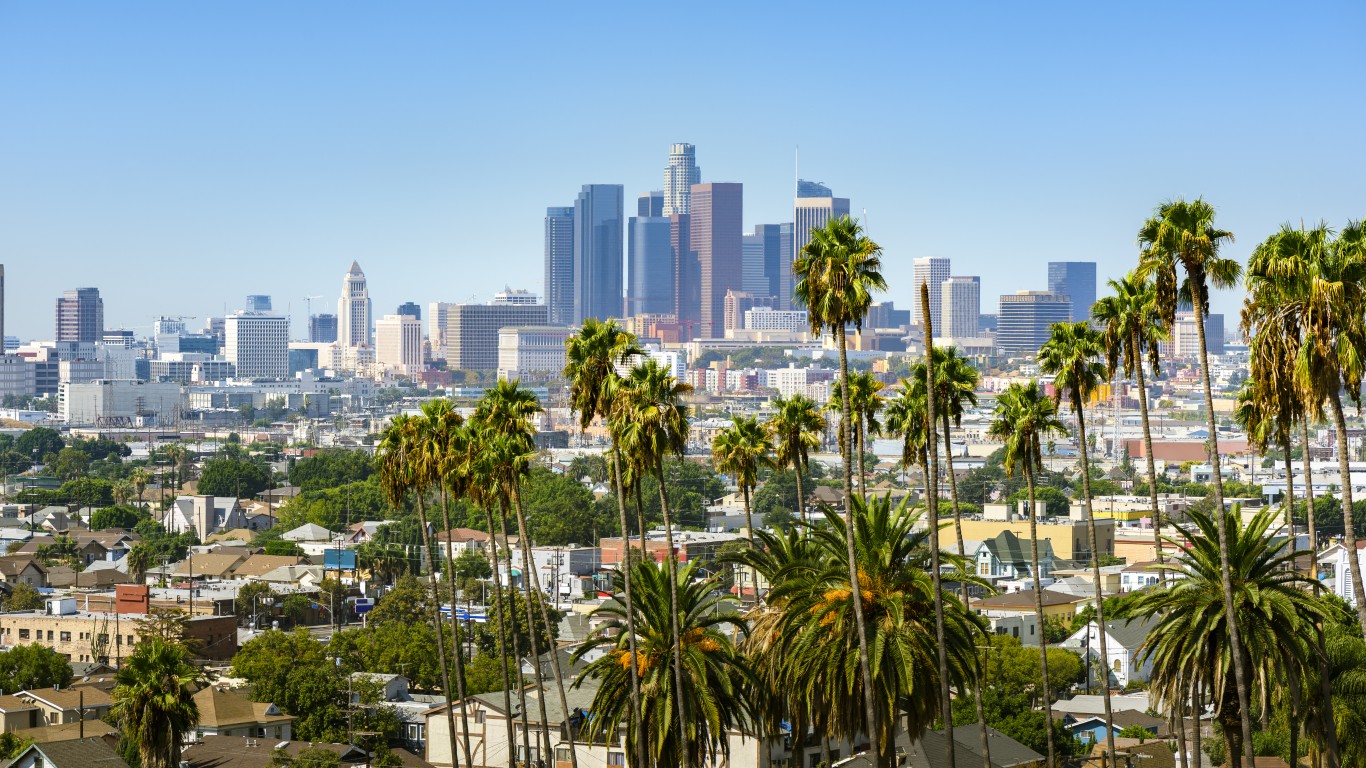
- Built up urban area, 2023: 2,671 square miles (or 6,918 square km)
- Estimated population, 2023: 15,587,000 — #21 largest of 986 urban areas
- Population density: 5,835 people per square mile (or 2,253 per sq km) — #852 densest of 986 urban areas
- World Bank geographical region: North America
- Country class (World Bank): High income
4. Atlanta, GA, United States
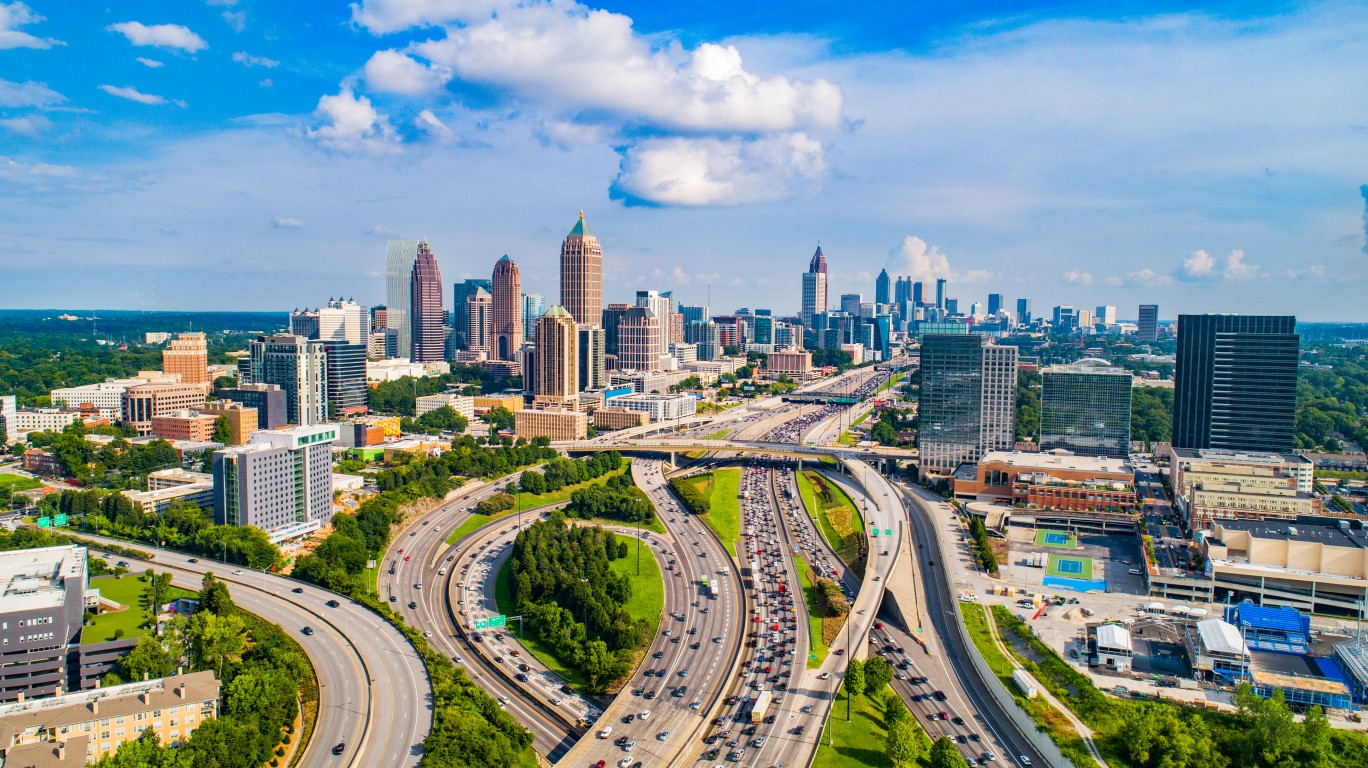
- Built up urban area, 2023: 2,858 square miles (or 7,402 square km)
- Estimated population, 2023: 5,702,000 — #86 largest of 986 urban areas
- Population density: 1,995 people per square mile (or 770 per sq km) — #977 densest of 986 urban areas
- World Bank geographical region: North America
- Country class (World Bank): High income
3. Tokyo-Yokohama, Japan

- Built up urban area, 2023: 3,388 square miles (or 8,775 square km)
- Estimated population, 2023: 37,785,000 — #1 largest of 986 urban areas
- Population density: 11,153 people per square mile (or 4,306 per sq km) — #547 densest of 986 urban areas
- World Bank geographical region: East Asia & Pacific
- Country class (World Bank): High income
2. Boston-Providence, MA-RI-NH-CT-ME, United States

- Built up urban area, 2023: 3,416 square miles (or 8,847 square km)
- Estimated population, 2023: 7,429,000 — #57 largest of 986 urban areas
- Population density: 2,175 people per square mile (or 840 per sq km) — #966 densest of 986 urban areas
- World Bank geographical region: North America
- Country class (World Bank): High income
1. New York, NY-NJ-CT, United States
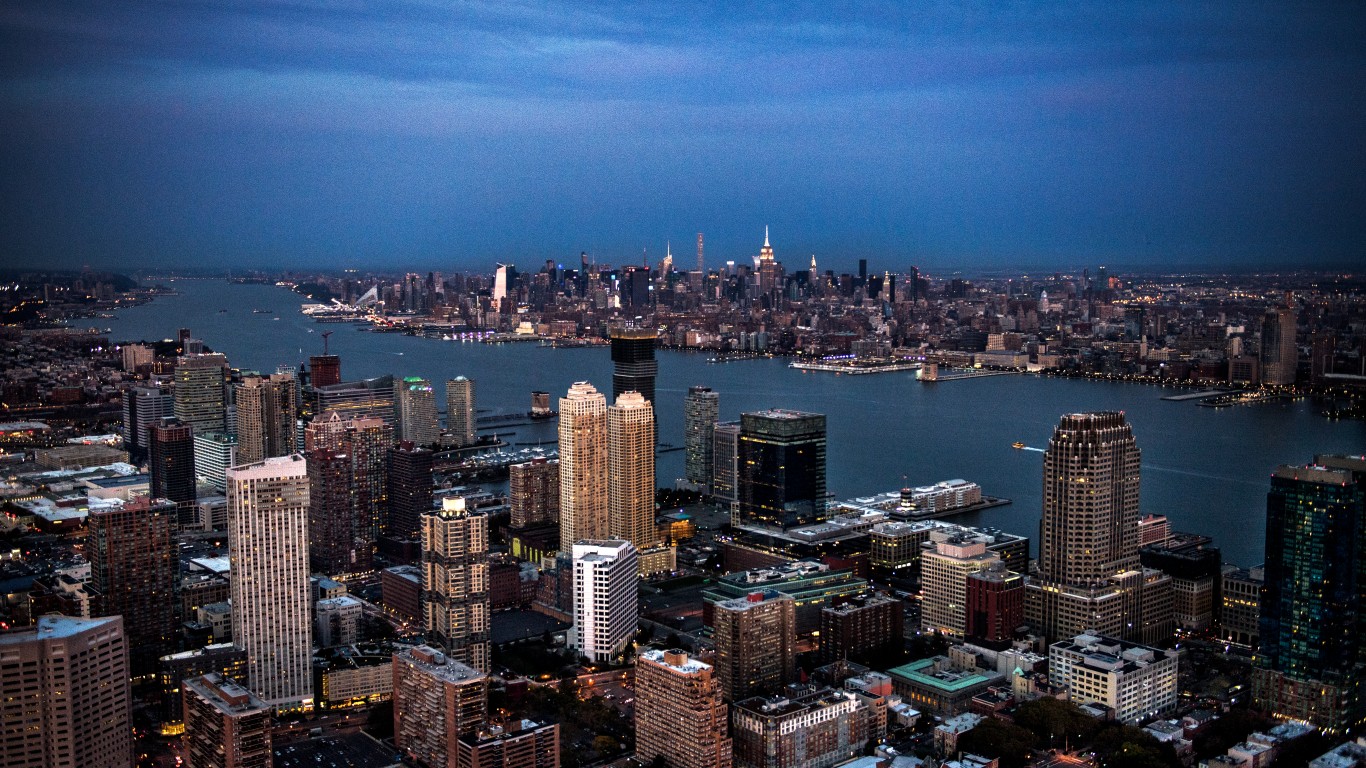
- Built up urban area, 2023: 4,380 square miles (or 11,344 square km)
- Estimated population, 2023: 21,396,000 — #13 largest of 986 urban areas
- Population density: 4,884 people per square mile (or 1,886 per sq km) — #895 densest of 986 urban areas
- World Bank geographical region: North America
- Country class (World Bank): High income
The #1 Thing to Do Before You Claim Social Security (Sponsor)
Choosing the right (or wrong) time to claim Social Security can dramatically change your retirement. So, before making one of the biggest decisions of your financial life, it’s a smart idea to get an extra set of eyes on your complete financial situation.
A financial advisor can help you decide the right Social Security option for you and your family. Finding a qualified financial advisor doesn’t have to be hard. SmartAsset’s free tool matches you with up to three financial advisors who serve your area, and you can interview your advisor matches at no cost to decide which one is right for you.
Click here to match with up to 3 financial pros who would be excited to help you optimize your Social Security outcomes.
Have questions about retirement or personal finance? Email us at [email protected]!
By emailing your questions to 24/7 Wall St., you agree to have them published anonymously on a673b.bigscoots-temp.com.
By submitting your story, you understand and agree that we may use your story, or versions of it, in all media and platforms, including via third parties.
Thank you for reading! Have some feedback for us?
Contact the 24/7 Wall St. editorial team.
